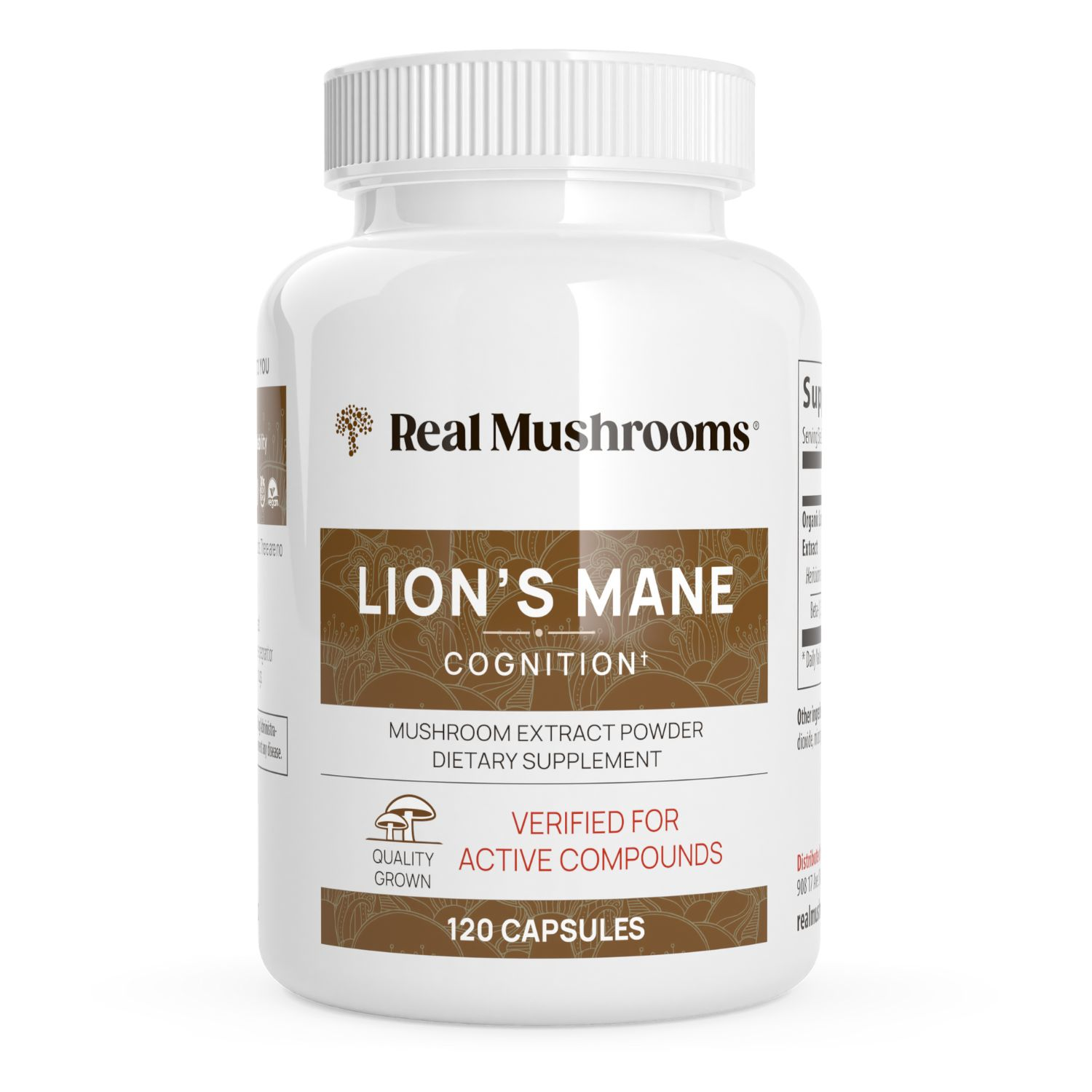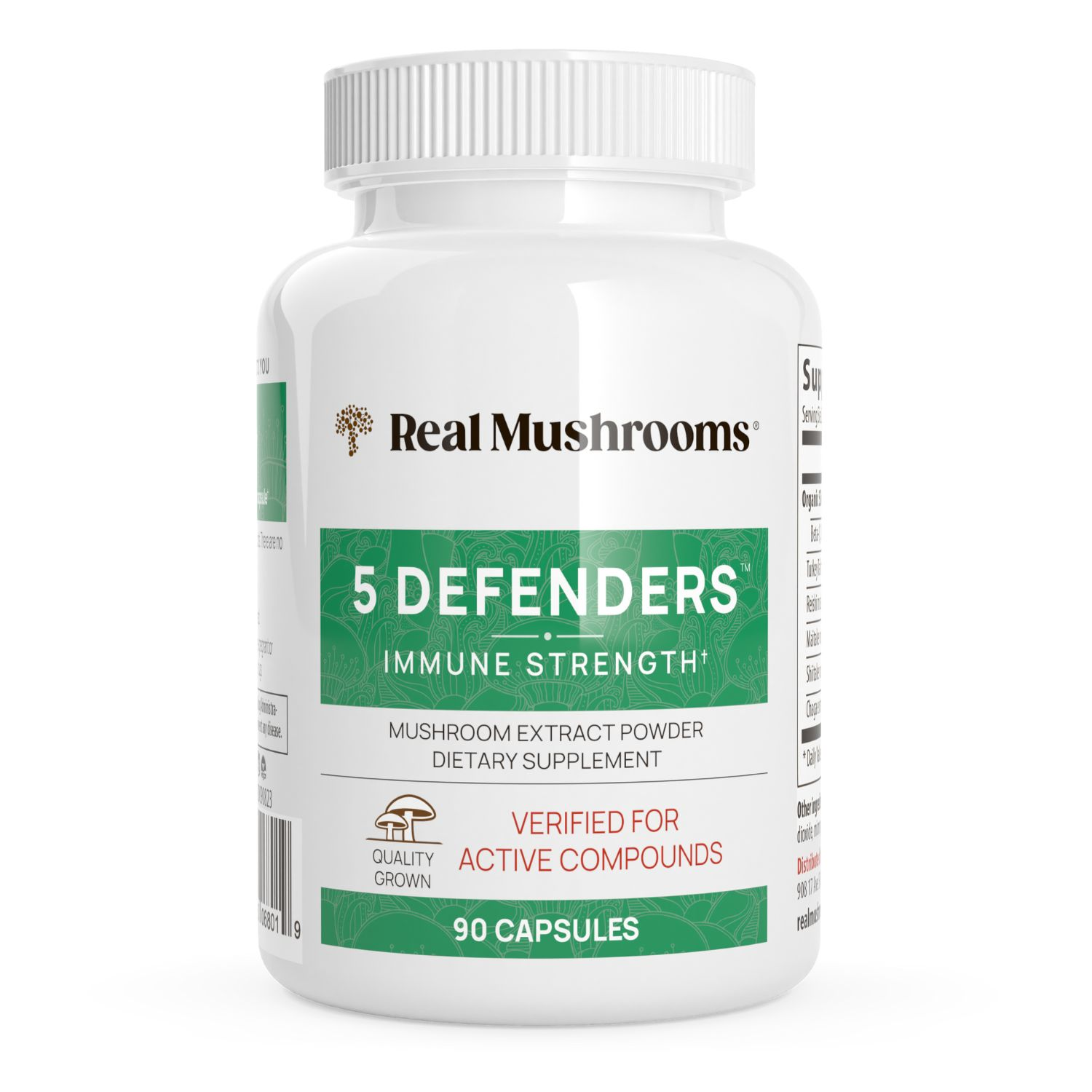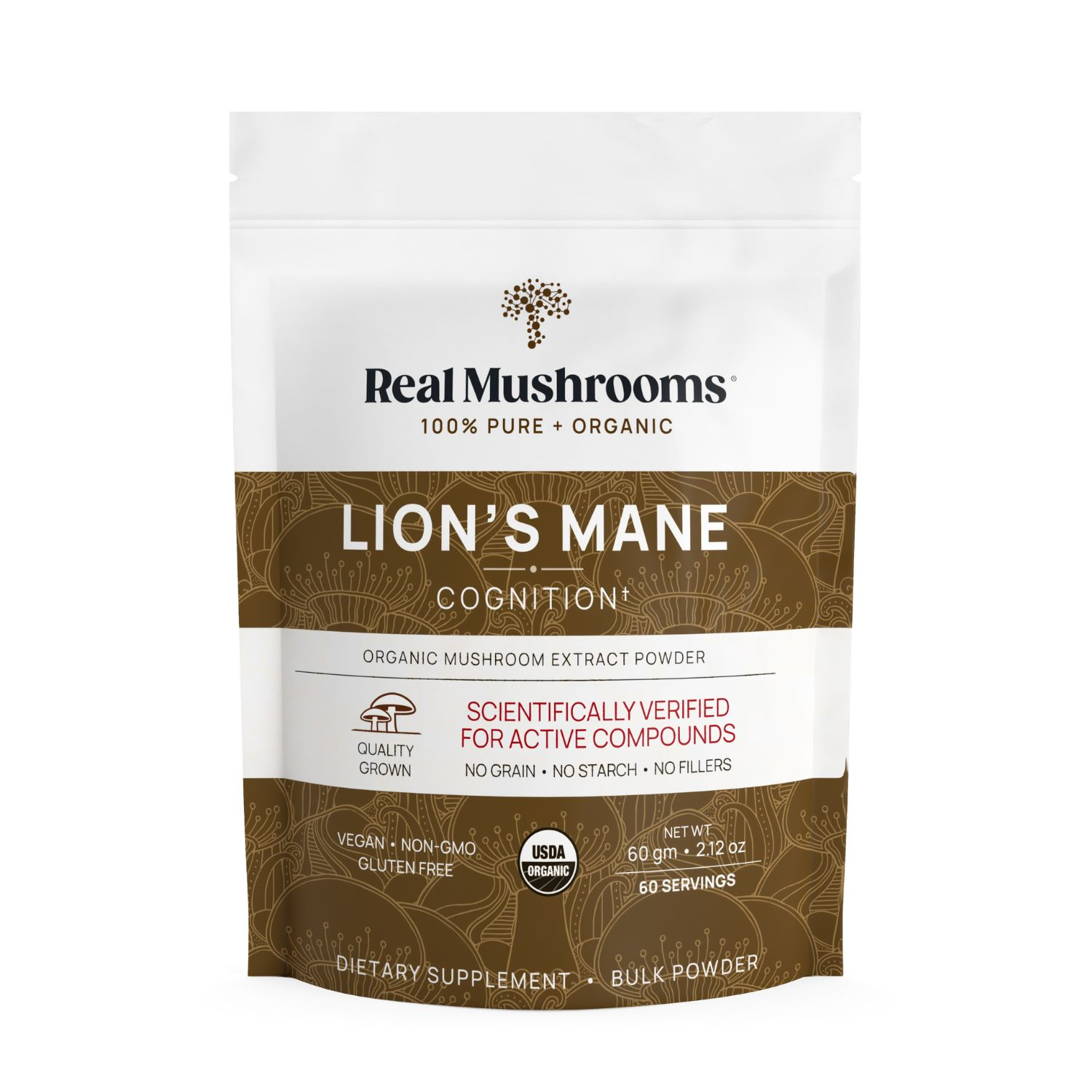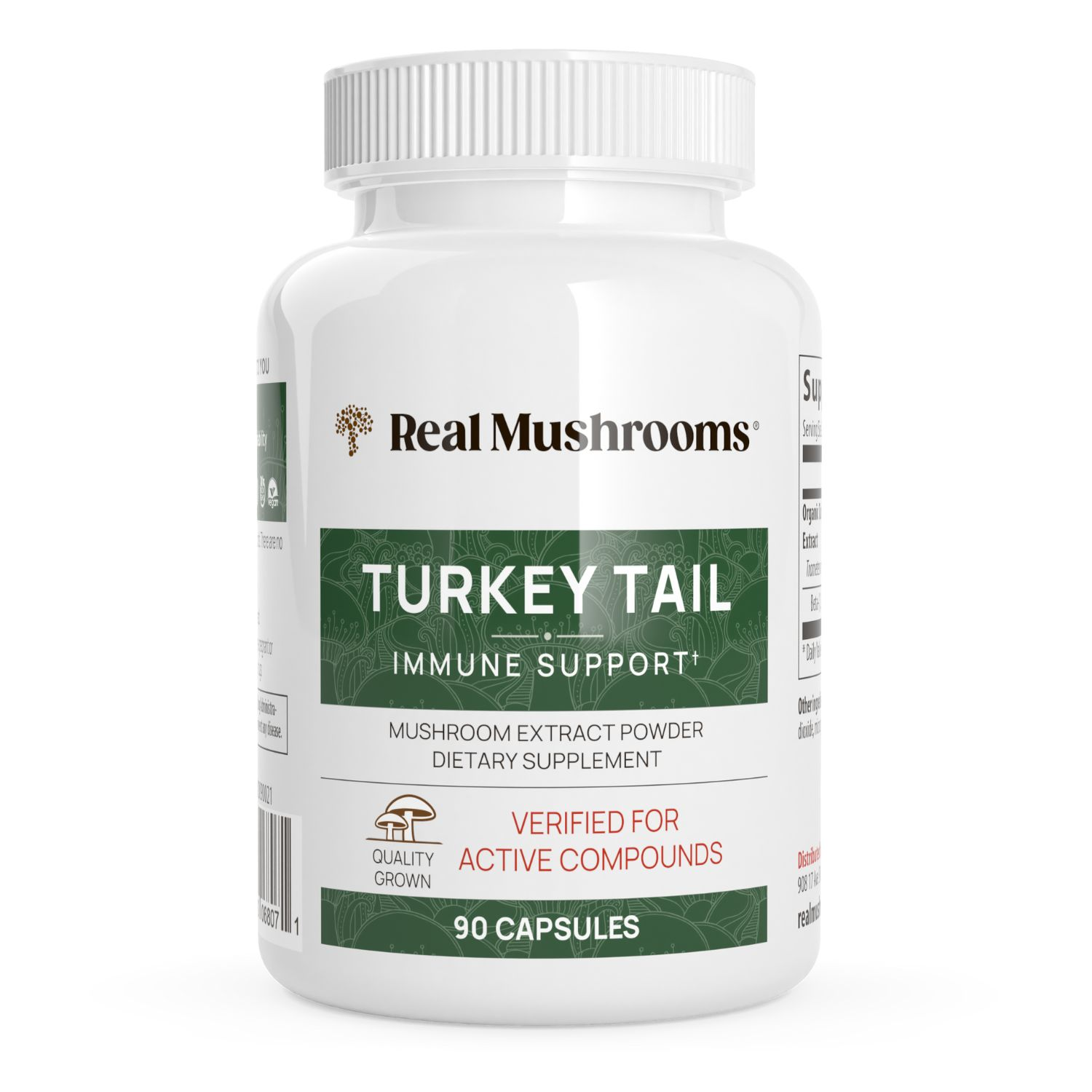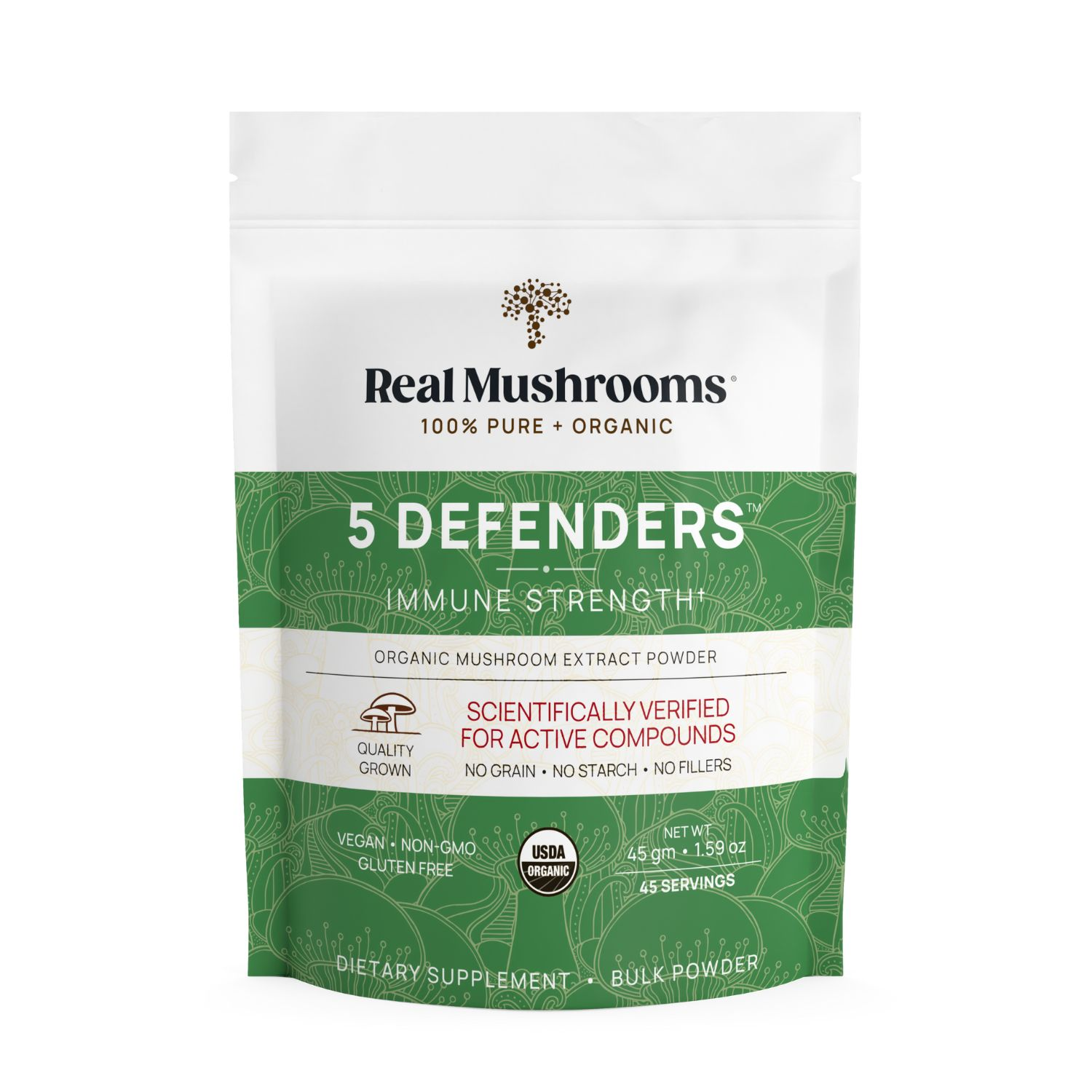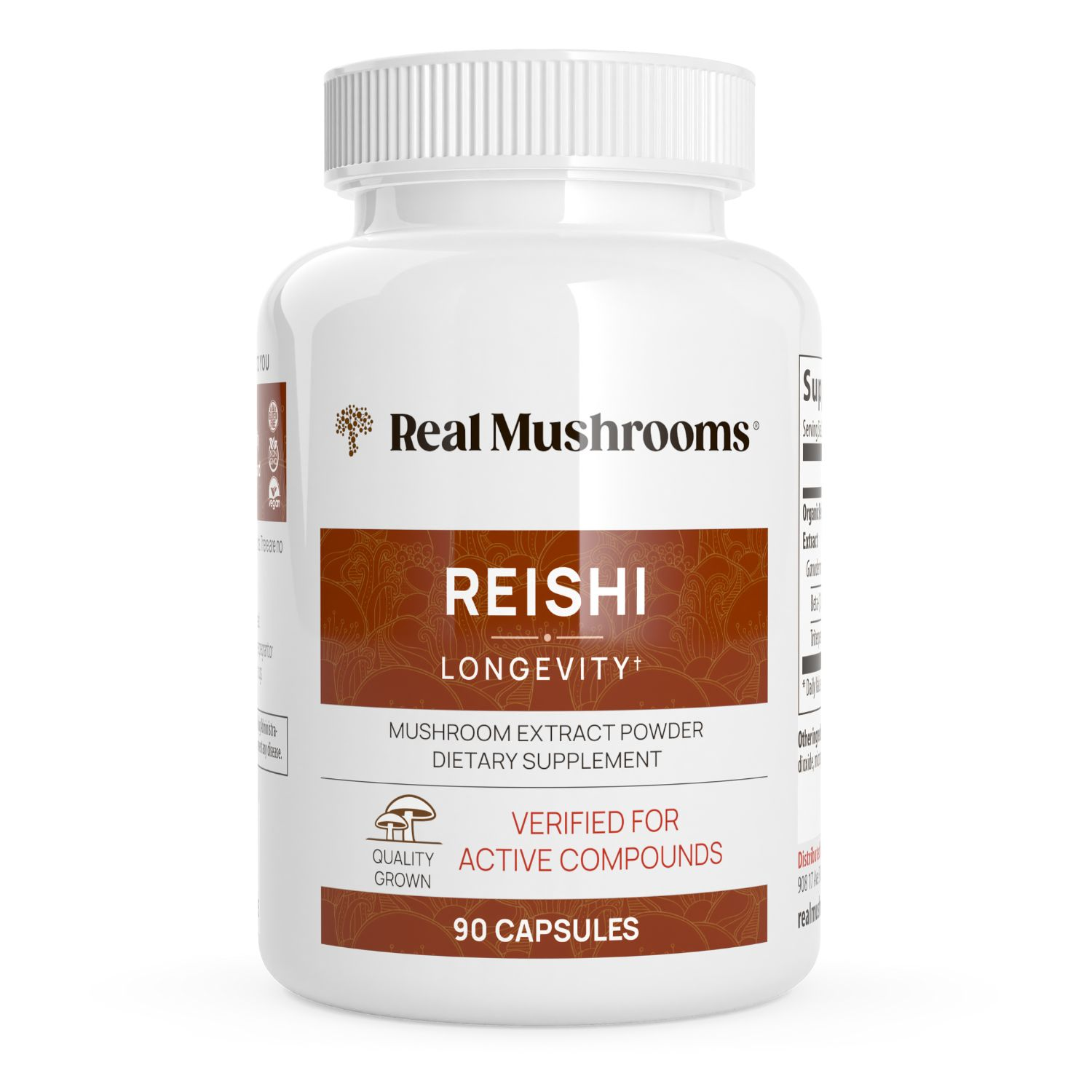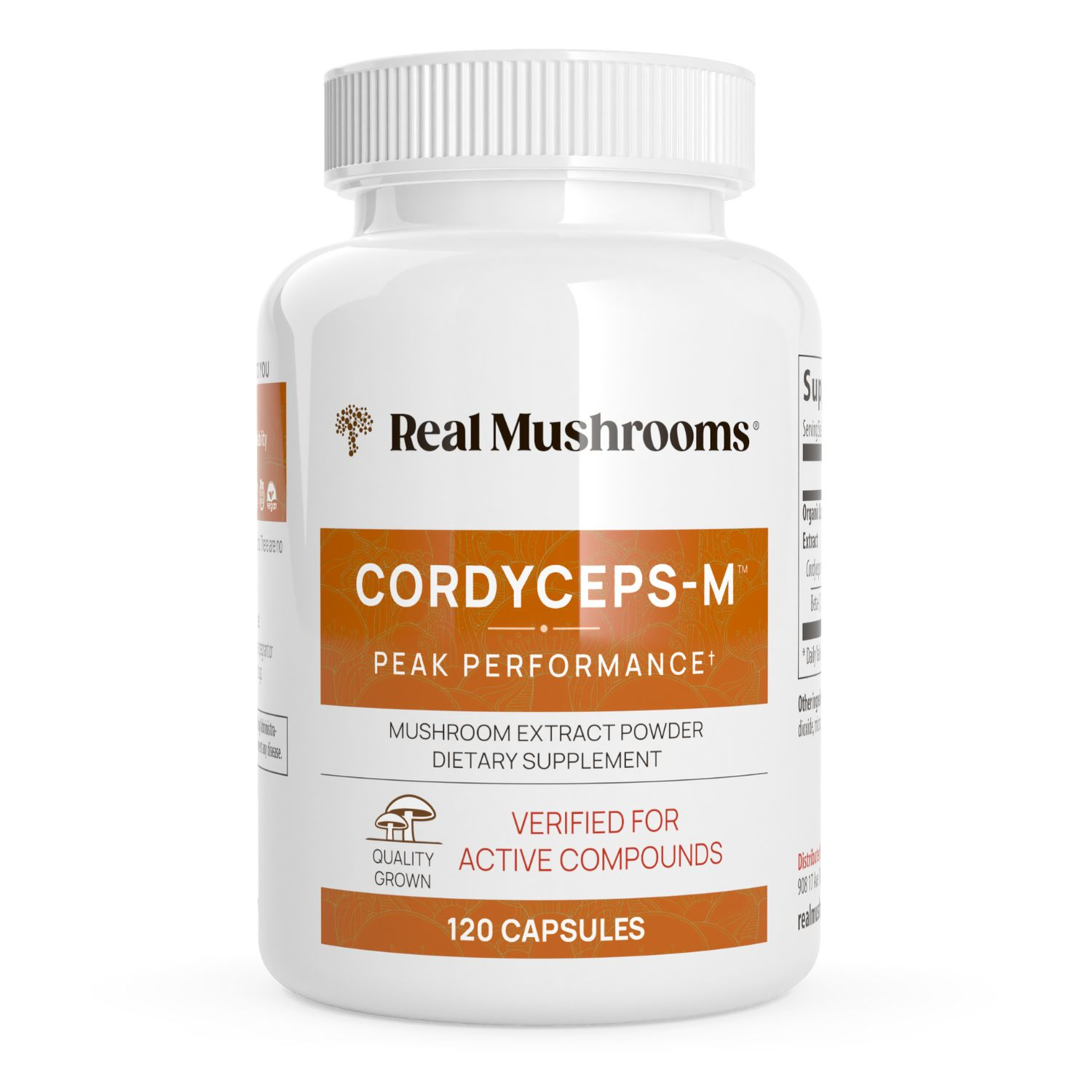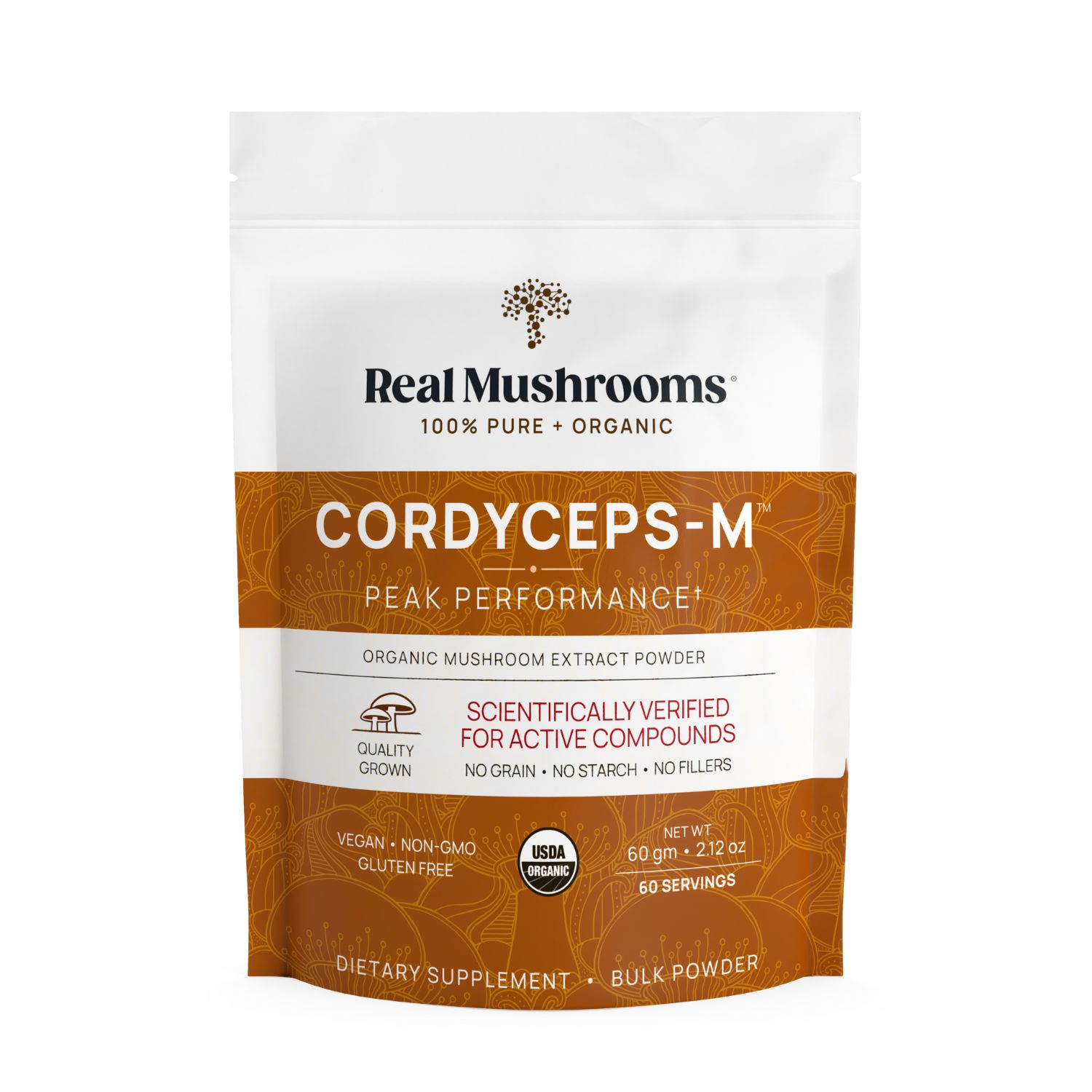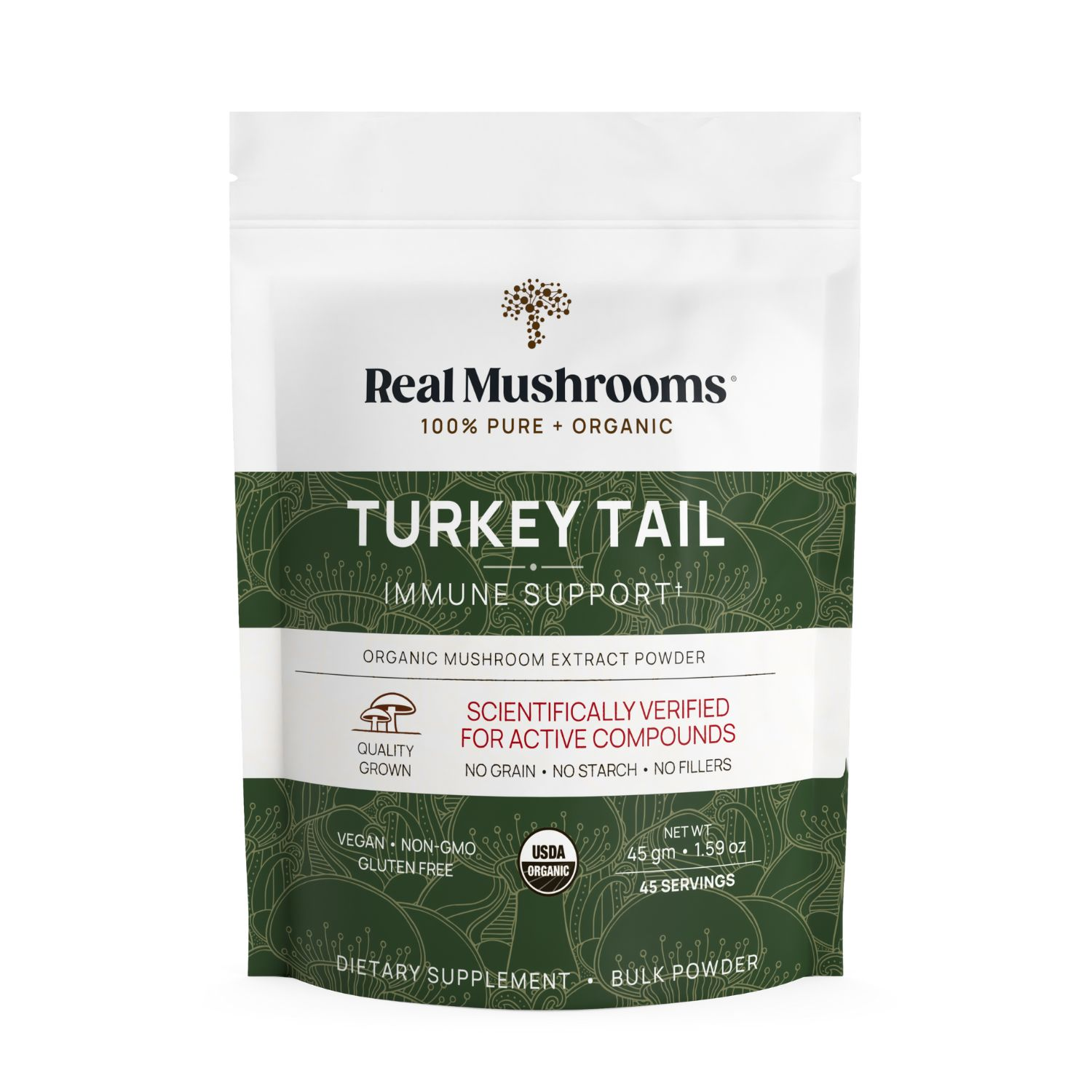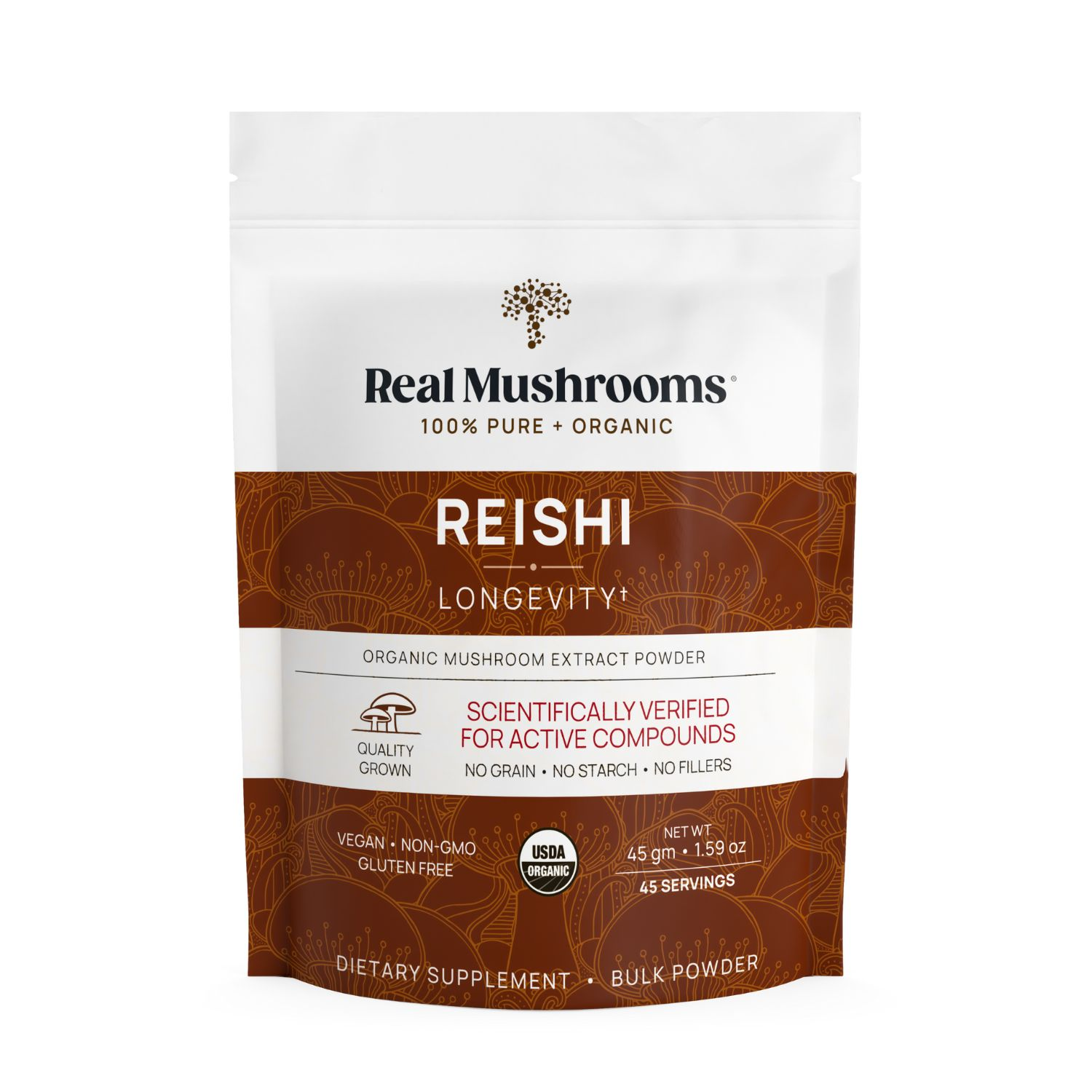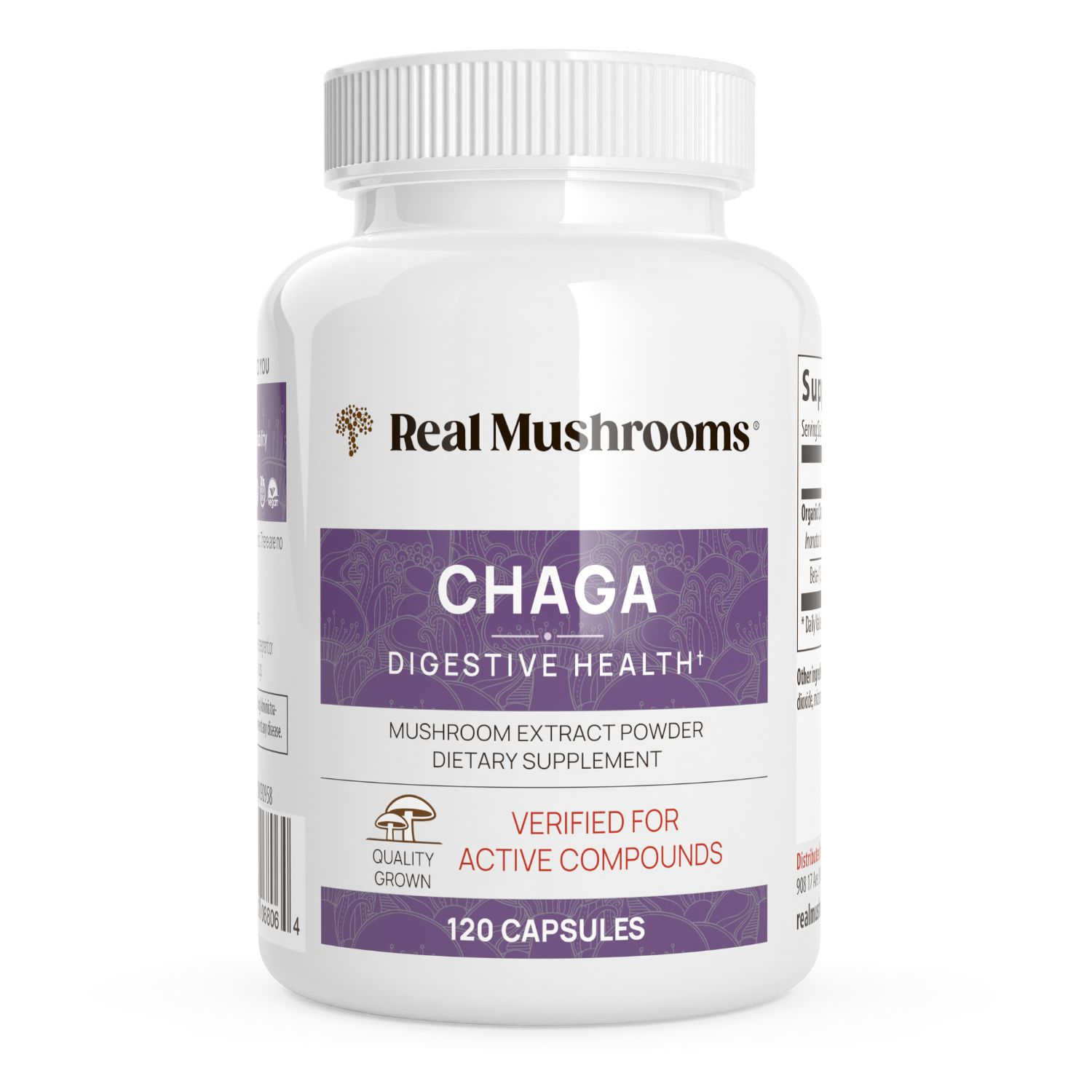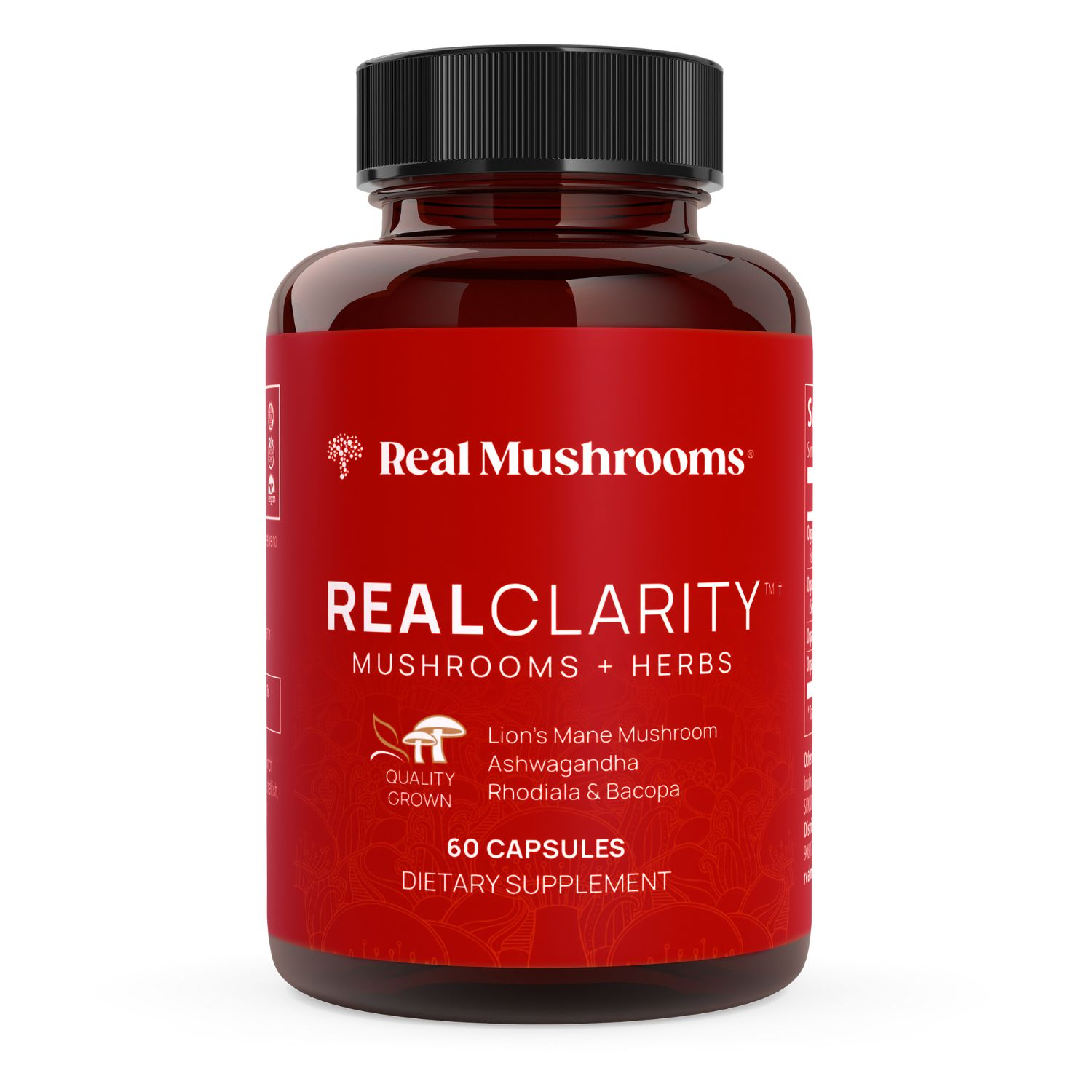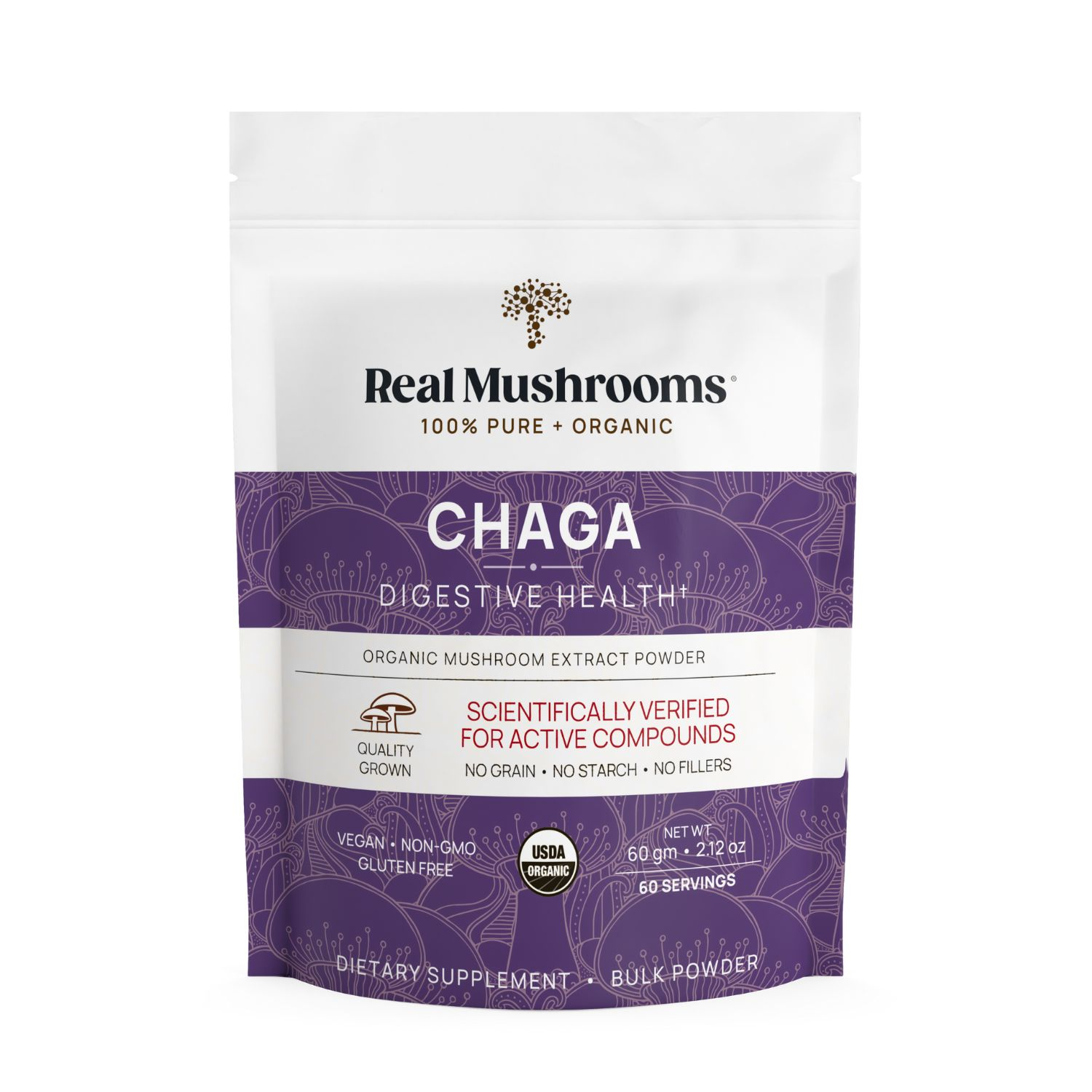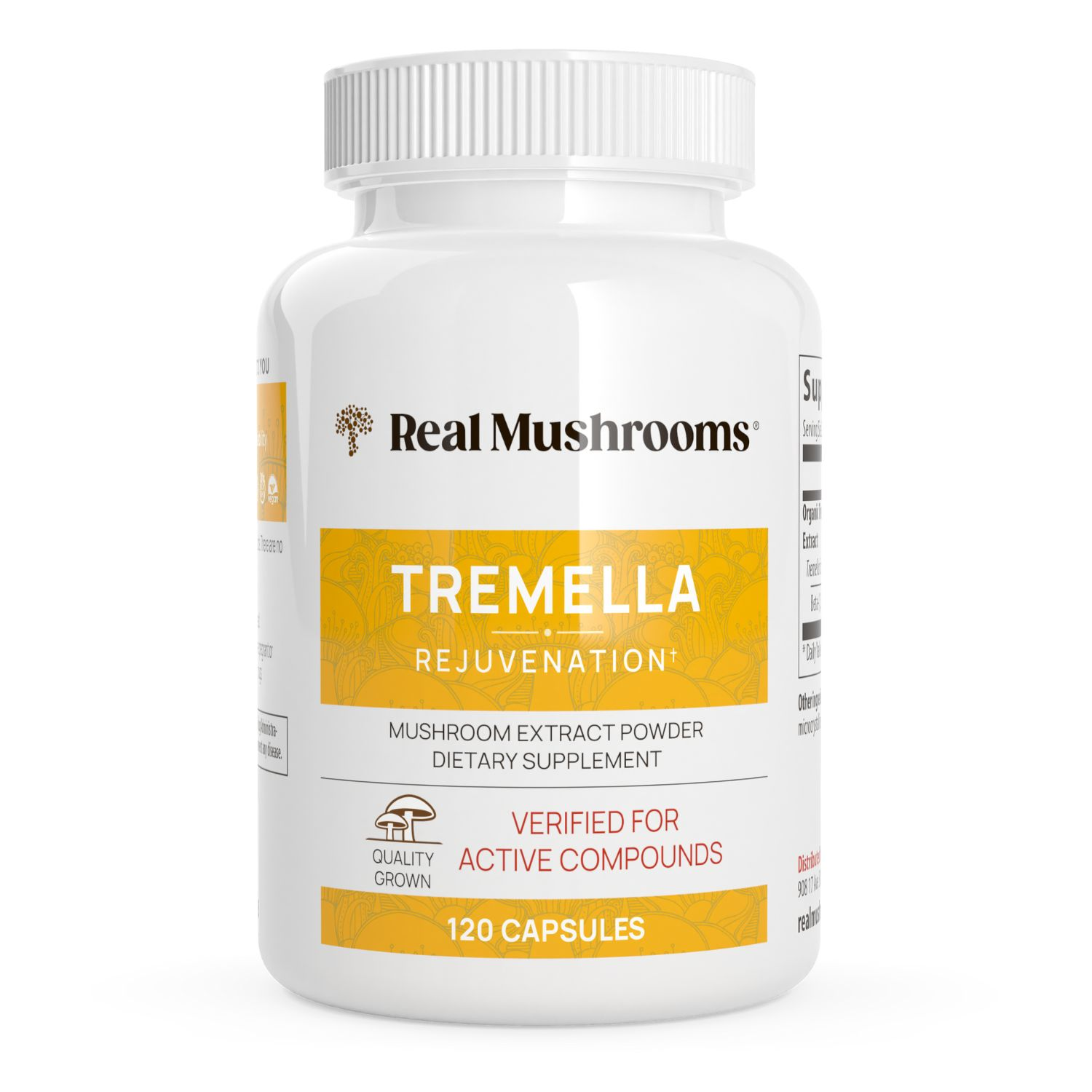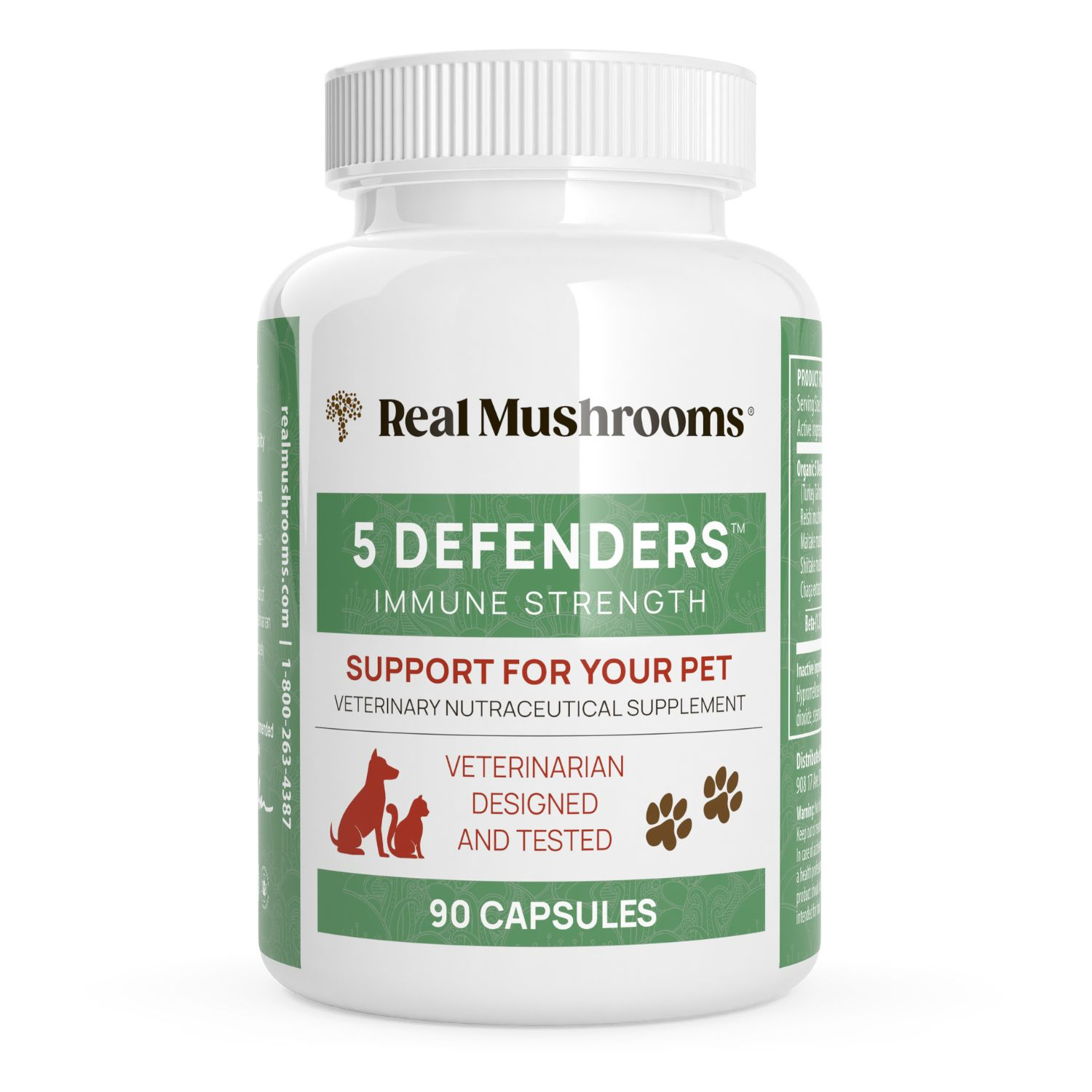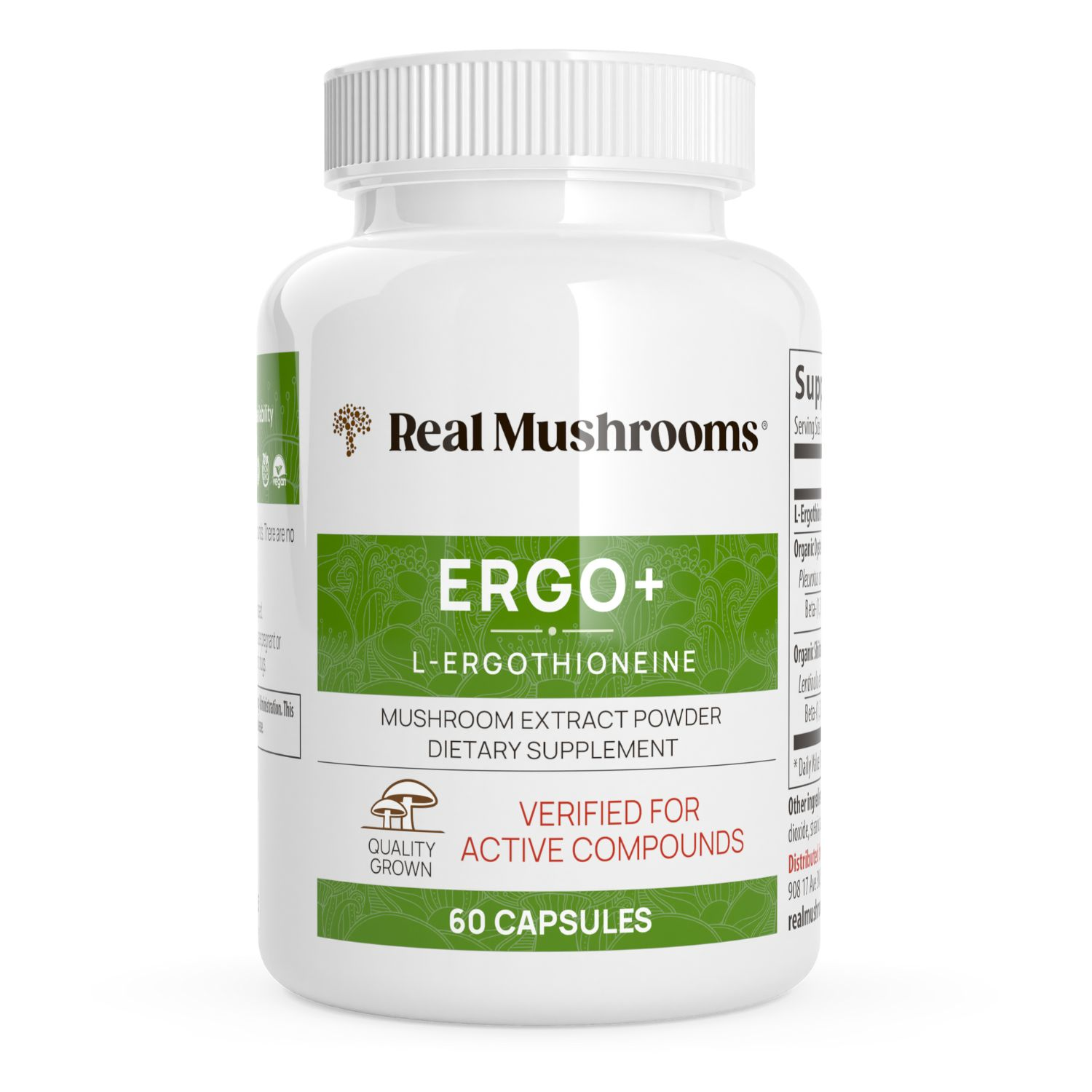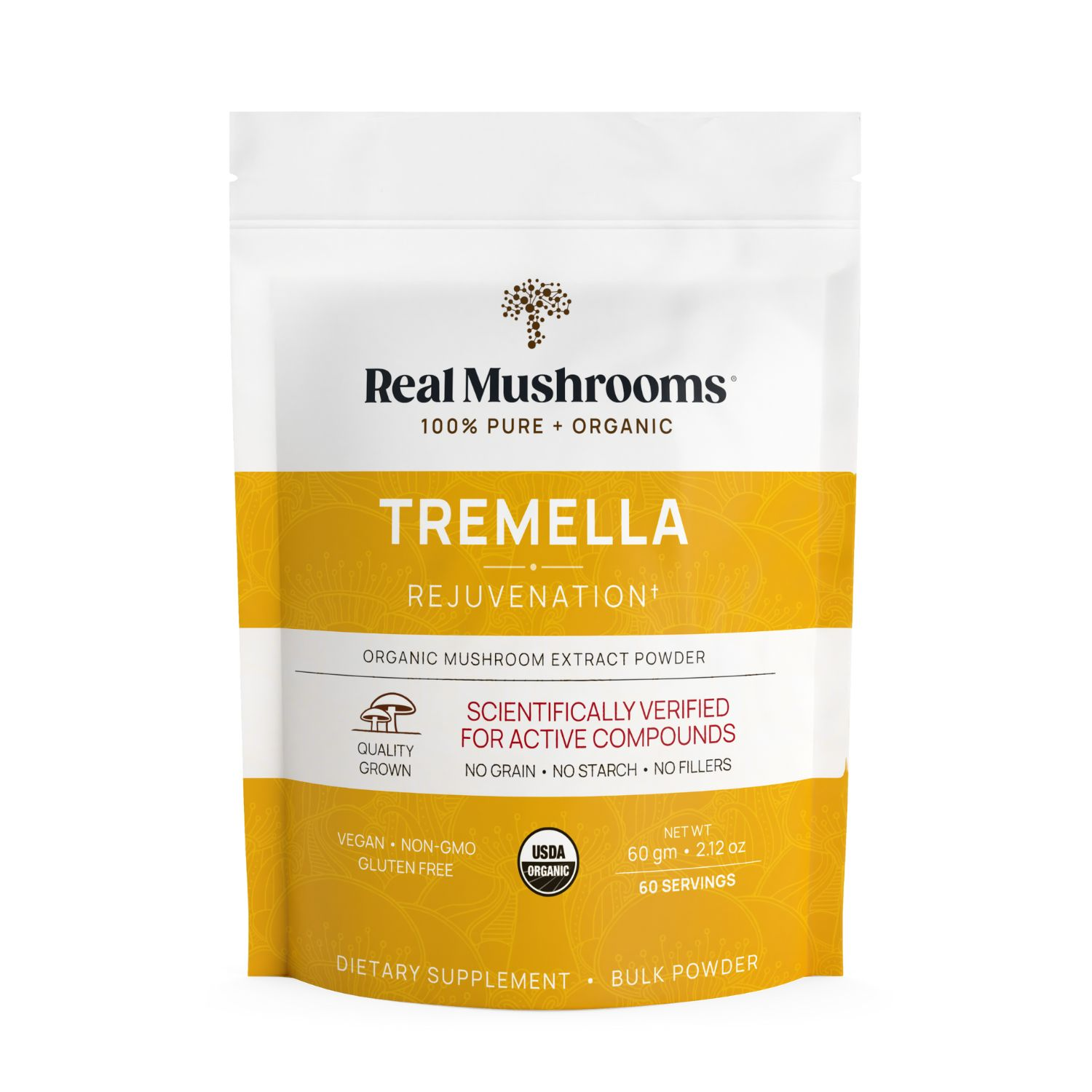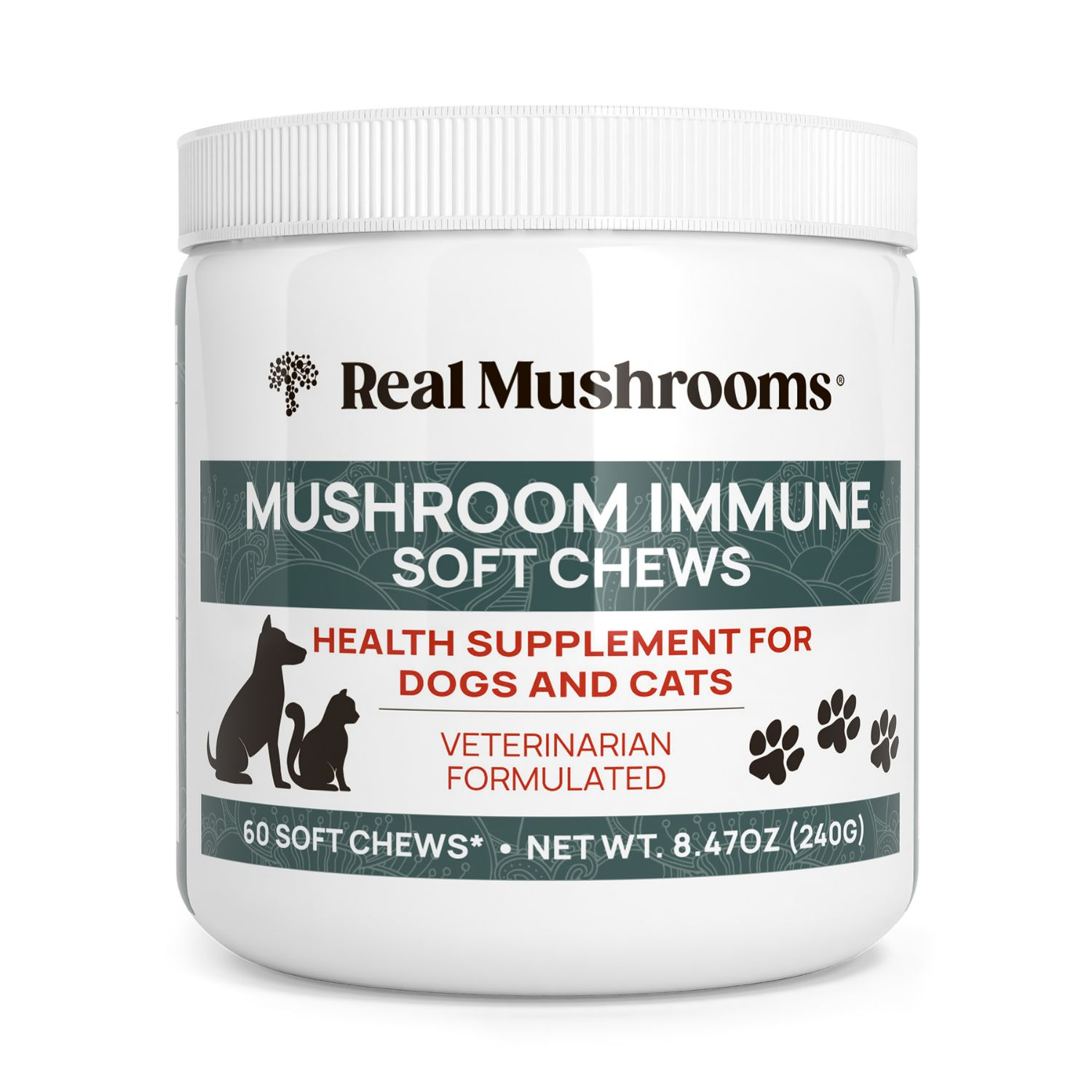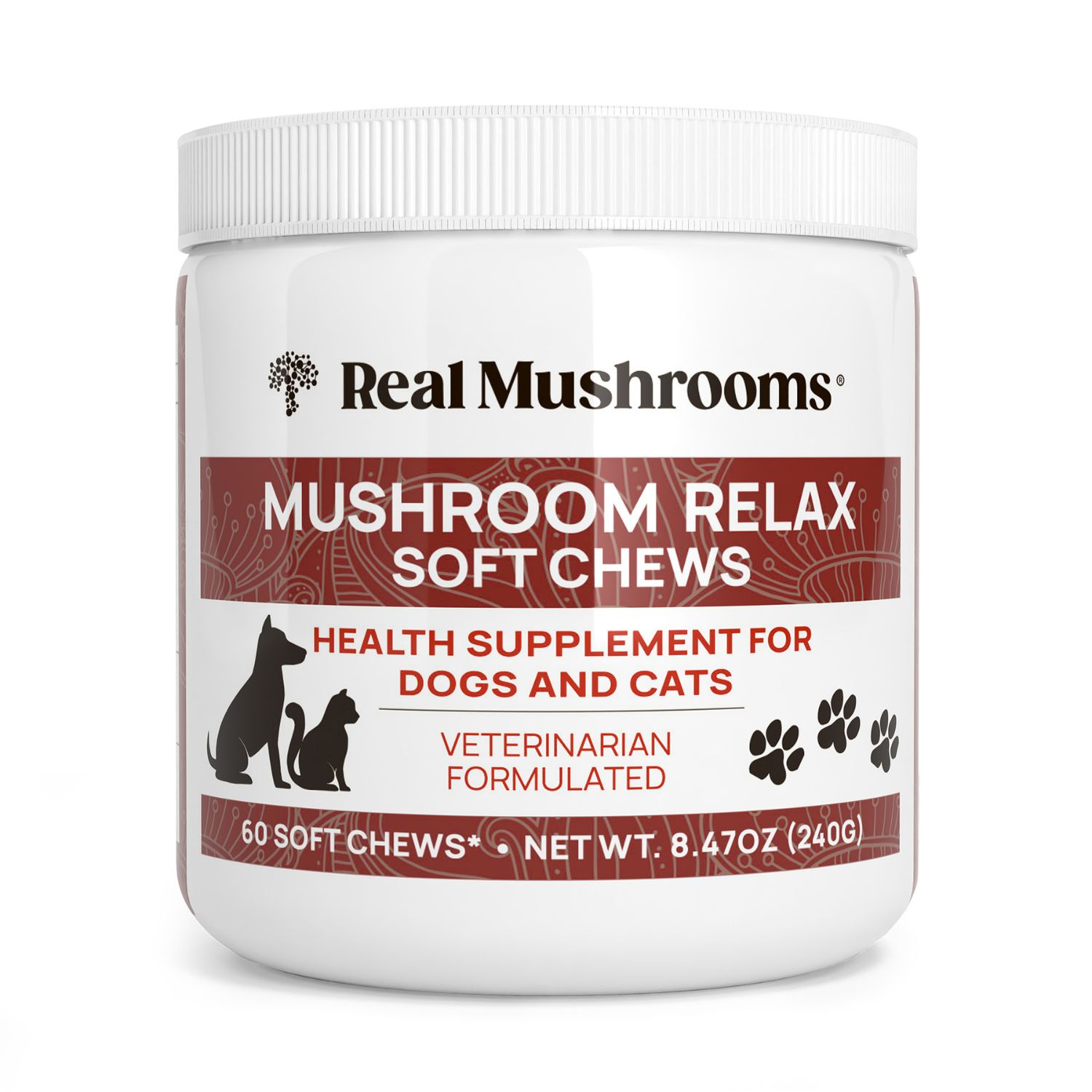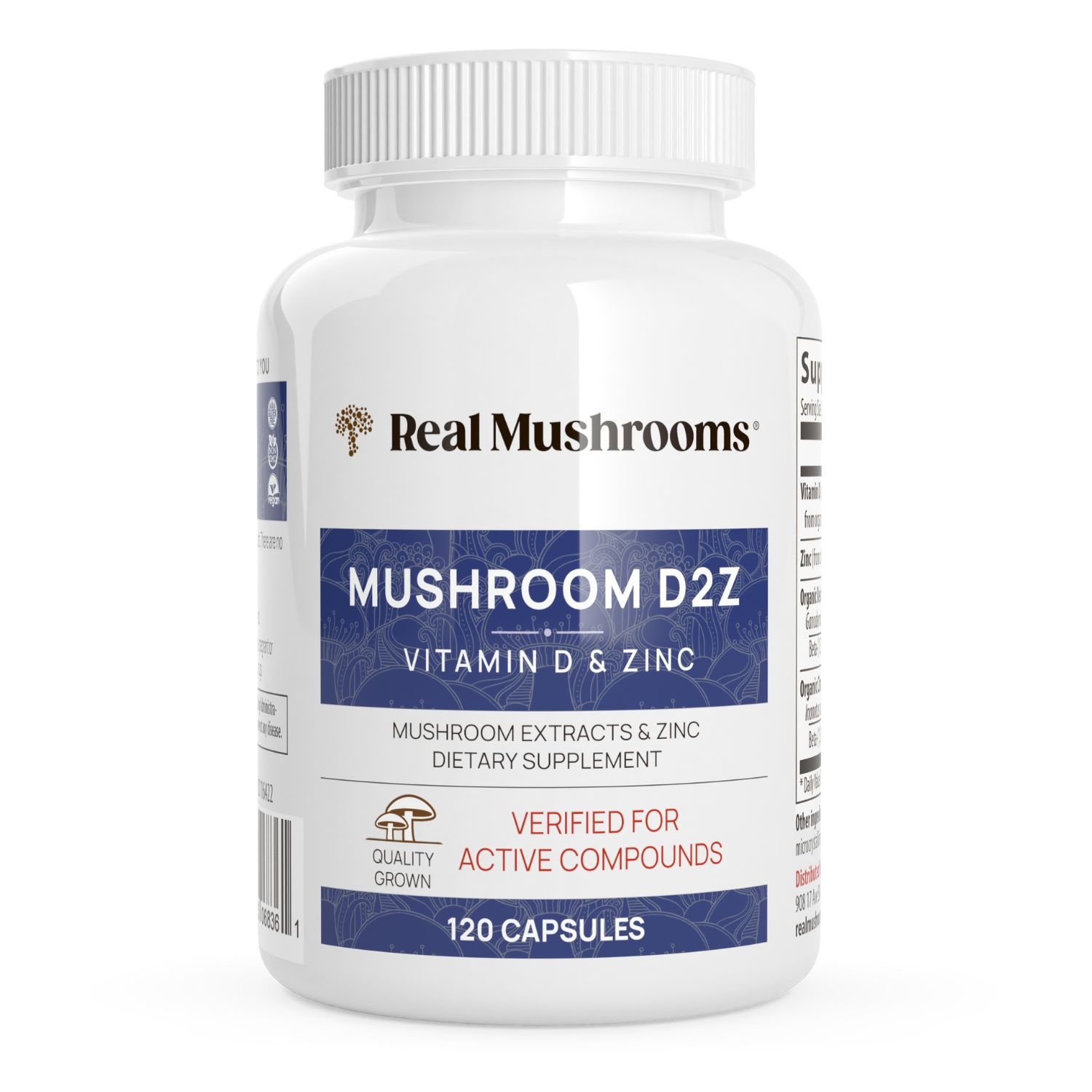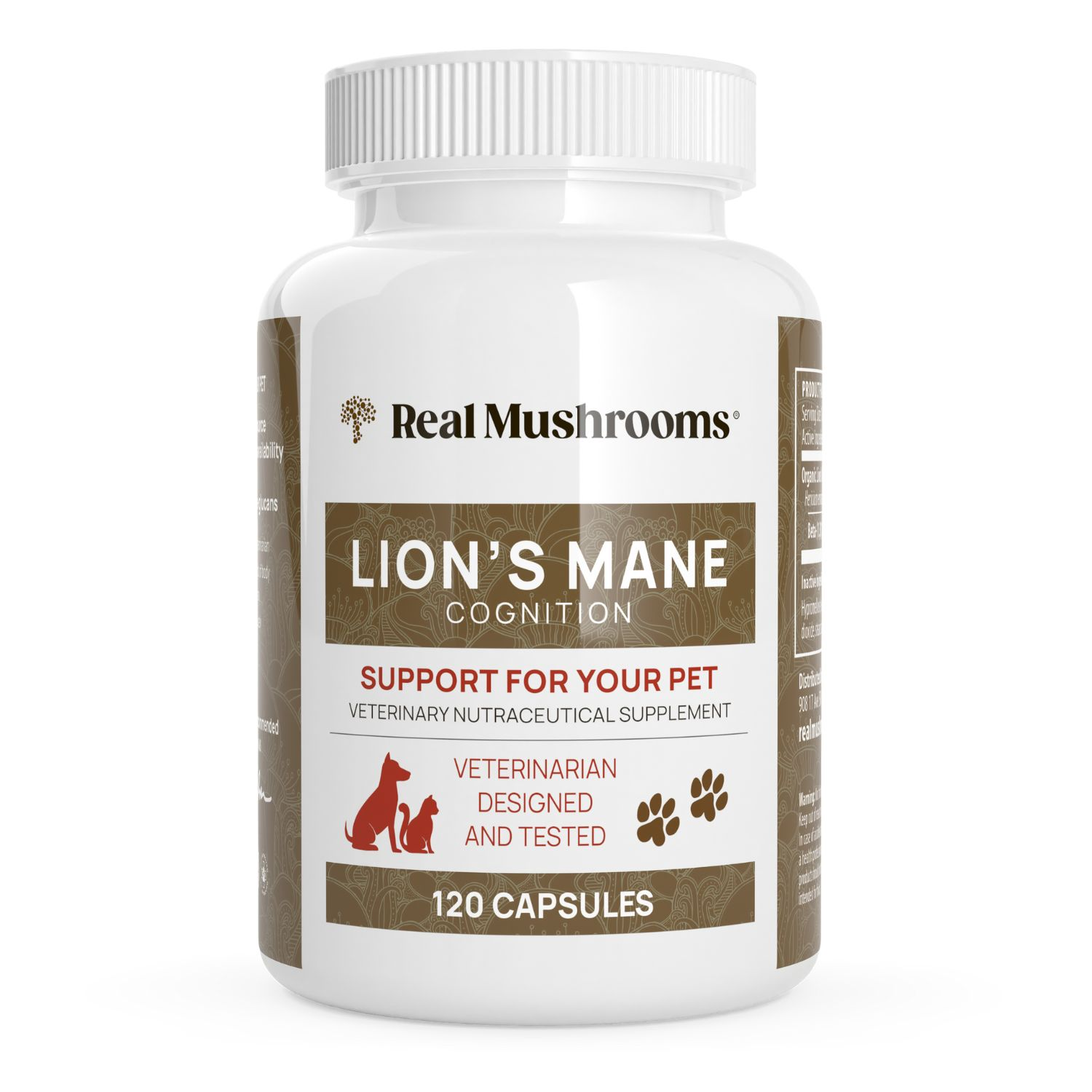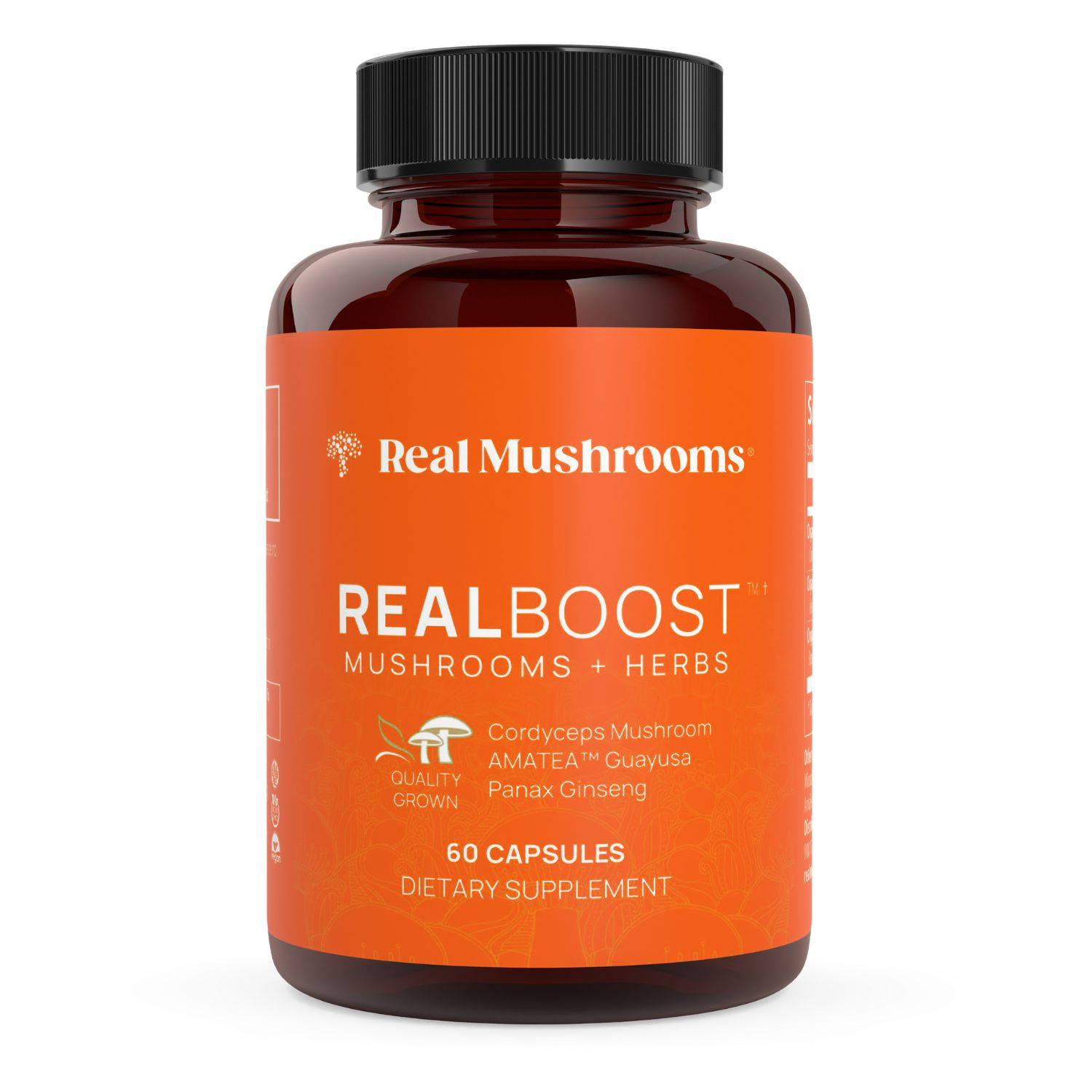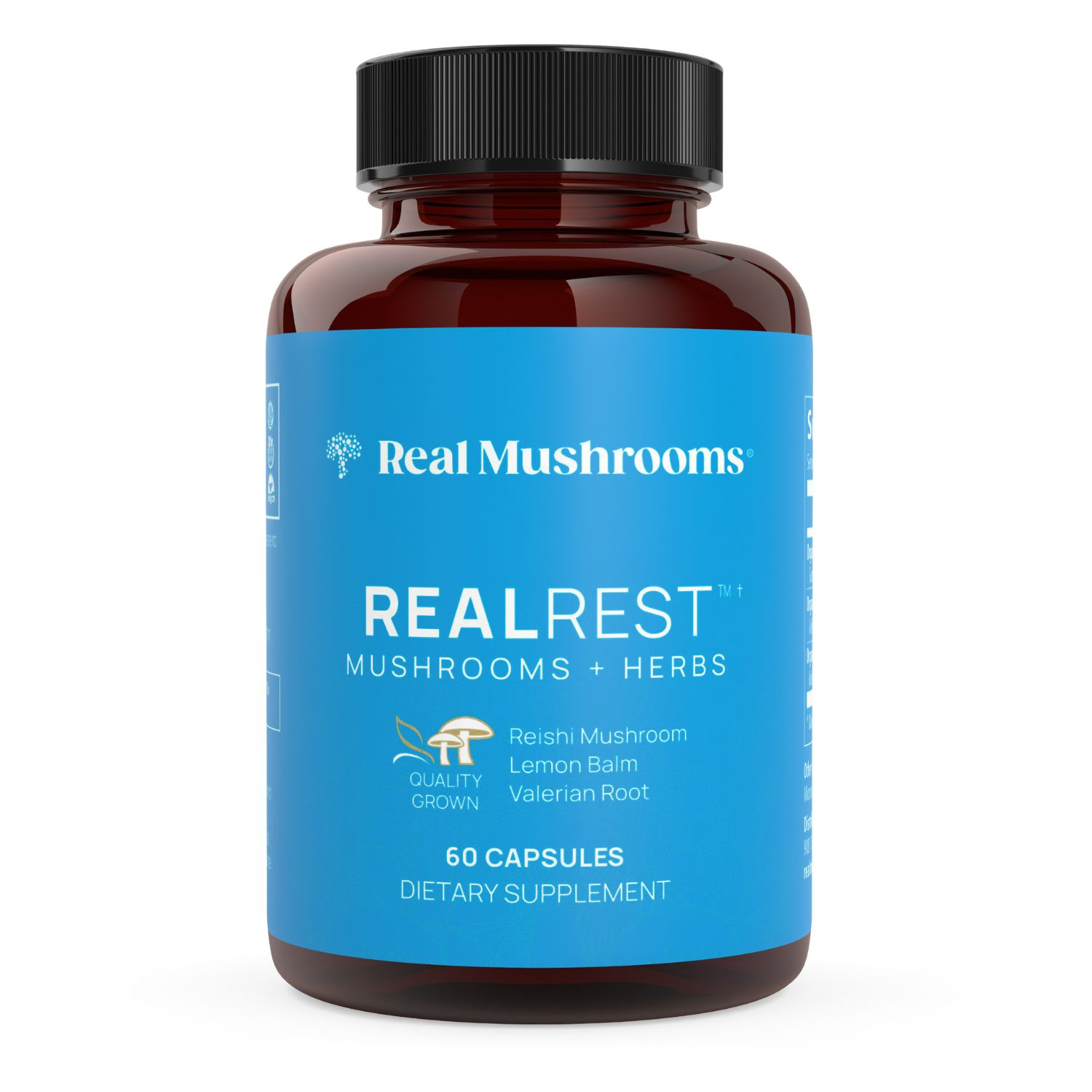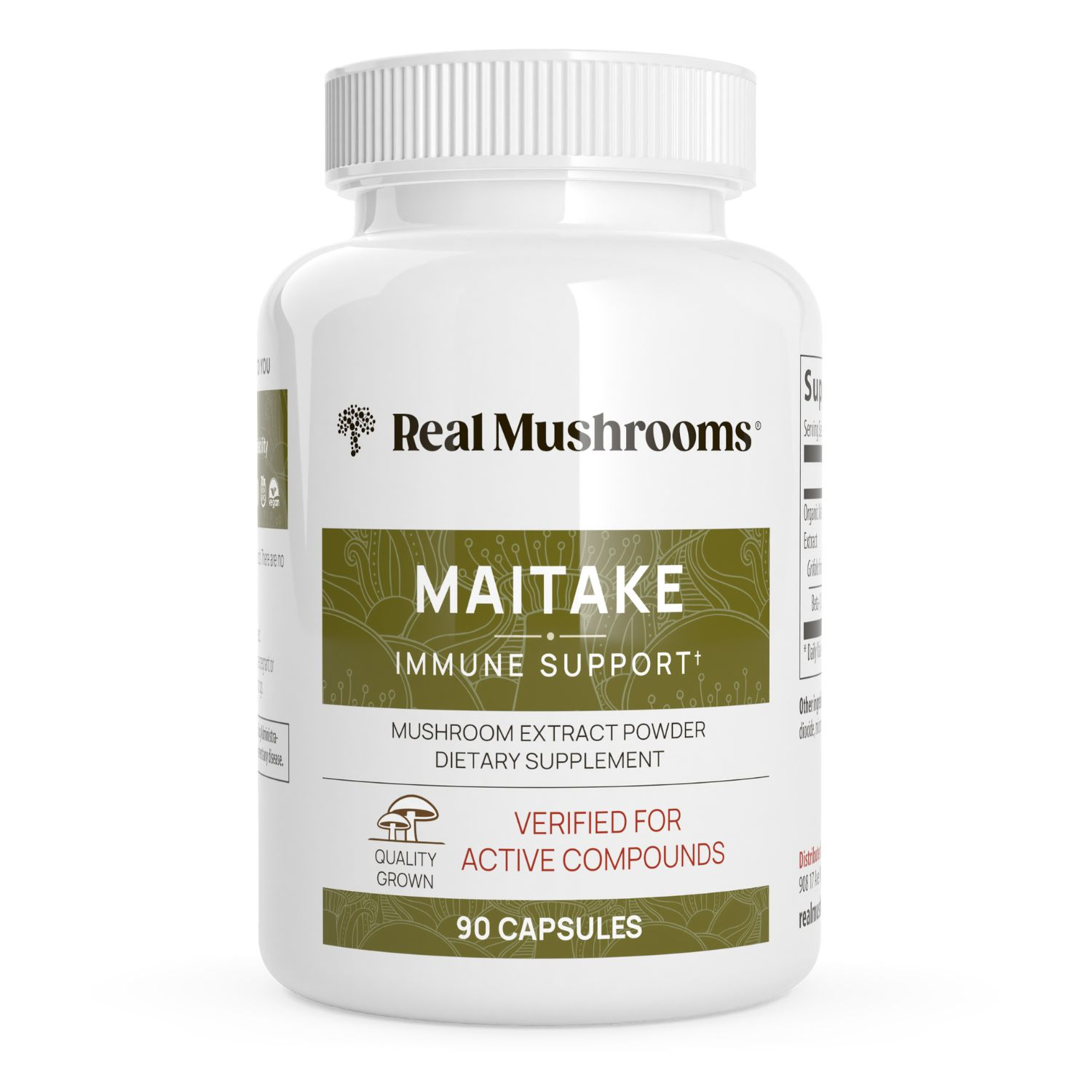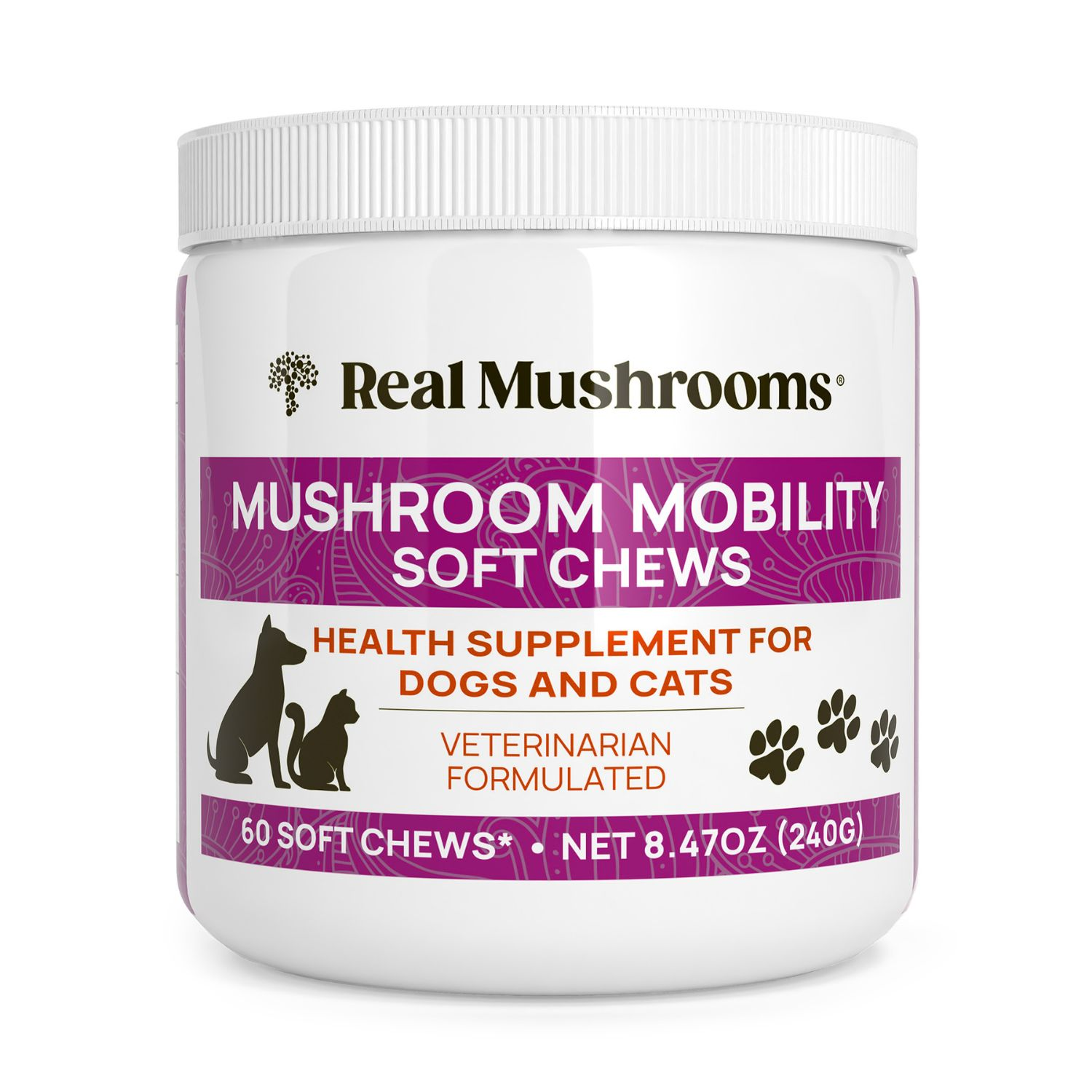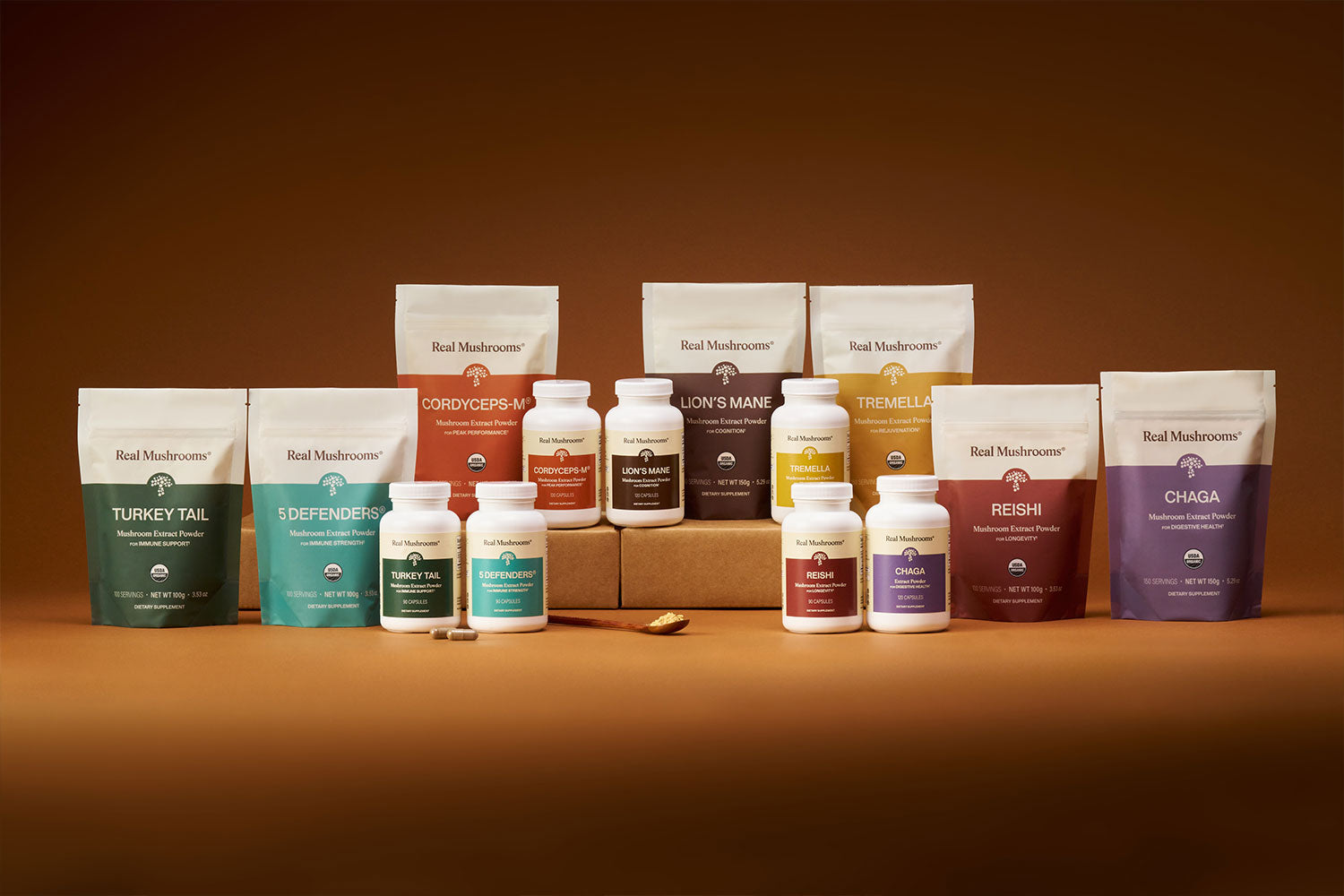Reishi Mushroom Benefits & Usage: A Comprehensive Guide
15 minute read
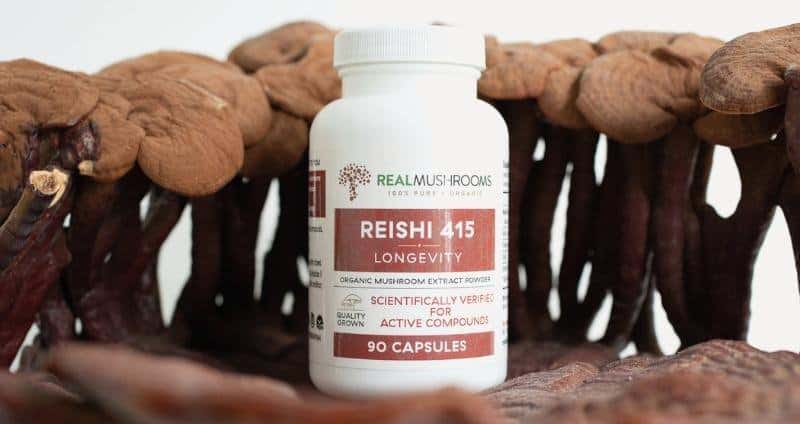
The storied reishi mushroom benefits for the mind and body were first discovered in Asia and its medicinal use can be traced back thousands of years. Among the wide variety of fungi used in traditional and herbal medicine, the reishi mushroom has one of the most varied and long-ranging histories. Excitingly, modern science confirms that the reverence for this fungus and its healing properties is well-founded.

In this guide, we will explore the origins and history of reishi mushrooms and how they came to be so revered. We’ll then look to the present and discover the many benefits modern science is suggesting that Reishi can provide to our bodies.
Finally, we’ll learn about how Real Mushrooms uses reishi to provide high-quality supplements that you can add to your daily health routine.
Sections in this guide:
- What are Reishi Mushrooms
- Historical Use of Reishi Mushroom
- Reishi Mushroom Benefits for Health
- Choosing the Right Reishi Supplement
- How to Safely Supplement with Reishi
- Real Reishi Mushroom Benefits - Key Takeaways
What are Reishi Mushrooms?
Reishi is a type of polypore: a woody type of mushroom that grows from trees and whose underside is smooth and composed of thousands of tiny pores, rather than gills. Polypores are also called bracket mushrooms or shelf mushrooms because of the way they sprout horizontally from trees.
It may surprise you to know that the term “reishi mushroom” doesn’t actually refer to one specific type of fungi. Reishi (also known as Lingzhi in China and Korea and “mannetake” in Japan) is simply the common name for the scientific genus of mushroom, Ganoderma.
The Ganoderma genus of mushrooms is found all over the world, and from the study of the mushrooms’ various properties, estimates suggest there could be as many as 2,000 separate species (1). The world’s most common reishi species is Ganoderma lucidum —lucidum is Latin for “shiny,” which refers to the varnished appearance of the mushroom’s surface. The most commonly used Ganoderma species in mushroom supplements are also Ganoderma lucidum (3).

Historical Use of Reishi Mushroom
Documented references to reishi’s reputation as a health booster date back as far as 2,400 years, and depictions of it frequently appear in ancient Chinese and Japanese artwork. However, the mushroom has likely been in use as a medicinal herb for over 4,000 years across the Eastern hemisphere, including both Korean and Indian cultures (15).
Ancient Chinese herbalists called reishi Lingzhi (灵芝) because it means “herb of spiritual potency.” Traditional Chinese Medicine (TCM) practitioners prescribe Lingzhi to influence the heart, lungs, liver, and kidney channels, to balance Qi (the body’s life force), calm the mind, and relieve cough and asthma. These practitioners called reishi “the mushroom of immortality” to describe the all-encompassing health support that this mushroom reishi could provide (2).
Learn more about the cultural history of reishi mushroom benefits in our articles:
- Reishi Mushroom History: Cultural Uses & Reverence
- The Benefits of Red Reishi and the 5 Other Color Types
Reishi Mushroom Benefits for Health
Using modern research techniques, scientists have determined that reishi mushroom benefits for supporting longevity and wellness are indeed abundant. This fungus contains over 400 different bioactive compounds including triterpenoids, polysaccharides, nucleotides, sterols, steroids, fatty acids, proteins, peptides, and trace elements (3).they contain hundreds of bioactive compounds, mainly in the form of polysaccharides and triterpenes, that assist the body in numerous ways (2).
Reishi Mushrooms are Adaptogens
The bioactive compounds in the reishi mushroom provide support to bodily systems that help them function at their best on a cellular level. It is one of the world’s most popular adaptogens because it helps the body and mind adapt fluidly to health stressors and maintain allostasis. Allostatis is the process of maintaining homeostasis through the adaptive change of the body’s internal environment to meet existing and anticipated demands (38).
While this fungus may not be able to grant “immortality” as believed in ancient times, modern research undertaken by scientists has confirmed a myriad of reishi mushroom benefits that can help contribute to a long and healthy life.

Reishi Mushroom Benefits at a Glance
- Alleviating occasional stress and restlessness
- Supporting restful sleep and a calm mind
- Supporting lung and respiratory health
- Promoting balanced blood sugar levels
- Supporting the immune system
- Supporting lower urinary tract
Reishi Mushrooms Alleviate Occasional Stress
Our stress response is characterized by the release of stress hormones such as cortisol from the adrenal cortex and the release of neurotransmitters such as dopamine, epinephrine (also called adrenaline), and norepinephrine from the adrenal medulla. Reishi’s polypeptides may help to regulate these responses and support the body’s natural process of bringing stress hormones back to normal, appropriate levels.
Forgetfulness, insomnia and palpitations are symptoms associated with significant stress; these symptoms are how reishi was and is used in TCM (33). Although there are no direct randomized control trials highlighting reishi’s impact on the hypothalamic- pituitary- adrenal axis, there are studies showing benefits to other systems involved in stress response. Neurasthenia refers to a former medical diagnosis consisting of physical and mental fatigue paired with poor memory and sleep difficulties (34). This diagnosis has been dropped from Western medicine but these symptoms are still relevant in many traditional medical systems in Asia (35).
When used together with lifestyle changes including nutrition, exercise, and behavior-based stress management, like mindfulness or meditation, reishi has the potential to support whole-body health. Reishi mushroom benefits for supporting general relaxation are also being investigated. Recent research shows that reishi has a calming quality that can help support a positive mood (7,38).
Reishi Mushrooms Support Restful Sleep and a Calm Mind
While reishi mushroom can benefit the mind to help alleviate occasional stress, similarly it can also be used as a supplement to support restful sleep. A study in rats found that reishi reduced sleep latency, which is the time it takes to fall asleep, and increased sleeping time (8). Researchers suspect reishi mushrooms impact sleep through the microbiome and serotonin connection (29). These rodent studies suggest that reishi may have GABA receptor activity, GABA is the neurotransmitter targeted in sleep medications (36).
Its general calming effects mentioned above can help you get to sleep by soothing everyday worry and racing thoughts. This is how reishi was used traditionally when referencing “calming the mind” (33). Promoting quality sleep should be prioritized, as sleep can affect many aspects of health (14). In a cold and flu study, reishi extracts paired with another herbal extract decreased sleep disturbances, a common symptom in individuals who are feeling sick (30).
Reishi Mushrooms Support Lung & Respiratory Health
Reishi may help support lung and respiratory health. In a mouse study, reishi supported a healthy inflammation response, reducing the sensitivity of the airways (28). If this effect translates to humans, reishi may support free and easy breathing. Reishi was traditionally used in Chinese medicine for bronchitis, a chronic lung condition impacting breathing (6).
Reishi Mushrooms Promote Balanced Blood Sugar Levels
Initial research suggests that reishi may maintain blood sugar levels already within a healthy range, which is promising news for those concerned with glucose control. Multiple animal studies have found that mice and rats treated with various extracts of reishi were better able to maintain healthy blood sugar levels (9). While there is more research to be done, reishi’s potential as a beneficial supplement for supporting balanced blood sugar is promising and warrants further investigation.
Reishi Mushrooms Support the Immune System
Reishi appears to have immune-modulating properties. Initial studies conducted in vitro as well as in animals have been promising for supporting reishi’s use as an immune-system booster. One study found that reishi beta-glucans increased the activity of immune cells, including natural killer cells and T cells, in rats (22). A systematic review of five well-designed studies in humans yielded similar results, finding that reishi significantly increased levels of T cells, while slightly raising levels of leukocytes (another type of white blood cell) (23). The researchers concluded that reishi stimulates host immunity, is well-tolerated, and has no observed toxic effects.
Studies have also shown that reishi can modulate and enhance immune cells like natural killer cells in those with a chronic disease (20, 31).
In one cell study, reishi was shown to work synergistically with cisplatin (a chemotherapy drug) by having anti-tumor effects on ovarian cancer cells and by enhancing the sensitivity of cancer cells to cisplatin (24).
Scientists attribute the reishi mushroom benefits of immune system support and modulation to its stores of beta-glucans. Beta-glucans are special polysaccharides that stimulate immune system function (27). Importantly, beta-glucans are found in the highest concentrations in the mushrooms (fruiting bodies), which is what Real Mushrooms’ products are made from — not the mycelium, which is what is typically used in other so-called mushroom supplements.
Reishi Mushrooms Support the Lower Urinary Tract
Benign Prostate Hyperplasia (BPH), structural bladder abnormalities, and other pelvic conditions can increase Lower Urinary Tract Symptoms (LUTS). LUTS is defined as any obstructive or voiding symptoms such as: hesitancy, straining, incomplete bladder feeling, frequency, urgency, and dribbling. Doctors and clinics use a questionnaire called the International Prostate Symptom Score (IPSS). This verified tool is not used for diagnostics but for treatment efficacy. In a human clinical trial, low dose reishi supplementation improved IPSS scores in men with LUTS (21). In a different study, out of 19 mushrooms tested, reishi had the most 5-alpha reductase inhibitory activity, making this a theoretical mechanism of action relevant in prostate and urinary conditions (19).
Reishi is the “King of Mushrooms” for Good Reason
These reishi mushroom benefits can sound almost too good to be true; however, the effects of reishi on the body are not to be underestimated. Clinical Herbalist Dr. Terry Willard states that he has recommended Reishi the most to patients in his decades-long practice because of its sheer versatility and capacity to enhance our physical, emotional, and even spiritual health. Willard calls it “the Merlin of the herbal world” and dives into why he has given it this auspicious title in the video below:
Choosing the Right Reishi Supplement
At Real Mushrooms, we are committed to providing you with a 100% certified organic, high-quality supplement that provides the maximum potential health benefits for your lifestyle.
Unfortunately, the market is filled with products that contain reishi mycelium (the root structure) instead of the mushroom itself. These products also end up containing the grain the mycelium is grown on. This results in a product with unnecessary filler and a low concentration of health-supporting compounds.
Alarmingly, there are countless reishi supplements that contain no traces of reishi at all!
Learn how to identify the best possible reishi supplement for your money. This will ensure you actually get a safe, potent, and authentic reishi product for your health.
Read our guide to learn how to pick an ideal reishi product: How to I.D. the Best Reishi Mushroom Supplement.

Types of Reishi Mushroom Supplements
Real Mushrooms offers two products derived from organic reishi mushrooms. Both of these are excellent and convenient ways to add reishi’s potent benefits to your daily routine:
Reishi 415 - Organic Reishi Mushroom Powder
Our 100% certified organic reishi extract is available in powdered form for a variety of uses. It is created with the dual extraction method for maximum benefit and is guaranteed to contain no fillers, starch, or myceliated grains. This product has been tested by third-party labs and confirmed to contain the valuable beta-glucans and triterpenes Reishi is loaded with.
We’ve assembled some delicious recipes that use reishi mushroom powder.
Recommended dosage: Adults, take ½ to 1 gram per day.
Reishi 415 - Organic Mushroom Capsules
Our capsules provide all the benefits of our Organic Reishi Mushroom Powder, with the added convenience of being in encapsulated form. If you’re looking for the health benefits of reishi without having to think about how to add it into a recipe, this is a great option for you.
Recommended dosage: Adults, take 2 capsules per day.
We’re confident in the efficacy and safety of our products. However, you should consult with a physician before starting any new supplement routine to make sure it’s the right option for you.

How to Safely Supplement with Reishi Extracts
Side Effects and Safety of Reishi Consumption
As with any dietary supplement, reishi mushroom use does have potential side effects. Luckily, reported cases of side effects are few and far between and generally very mild. While its use is common and generally safe, it's important to always speak with a health care provider before using reishi mushrooms. It is imperative to know that when evaluating scientific data on reishi supplement safety, most case reports and safety issues don’t specify the source. In two case studies reporting harmful side effects of reishi supplementation, there were a few unknowns such as: source, interaction with other herbs or pharmaceuticals, and pre-existing health concerns (25, 26). That is why it is important to source high-quality reishi supplements made from real mushrooms that come with a certificate of analysis, a health product regulation number, and an adverse effects reporting system.
Potential side effects include mouth dryness, upset stomach/diarrhea, rash, and headache. While these are uncommon, anyone experiencing side effects should discontinue use immediately and consult a physician.
Pregnant women should avoid taking reishi supplements. Reishi supplements have not been studied extensively in clinical trials involving pregnant women, leaving experts to suggest avoidance for safety reasons (10). In a meta-analysis using high doses of reishi or turkey tail in 23 trials with over 4200 patients, seven trials showed that adverse events decreased with the adjunct use of these mushrooms (32).
One of the reishi mushroom benefits is its immune system modulating effects. As such, possible side effects from reishi mushrooms can sometimes occur as the immune system shifts or can result from the awakening of a dormant immune system response. These side effects are harmless except in the unlike and rare case of a true allergic response. Allergic reactions seen in anaphylaxis have signs and symptoms such as: shortness of breath, facial swelling (eyes, lips), hives or other rashes, nausea, vomiting, sweating, fast pulse, and low blood pressure.
Possible Reishi Drug Interactions
Reishi mushroom has the potential to interact with anti-platelet (above 3 grams per day), anti-diabetic and anti-hypertension medications (16, 17). Those with known clotting disorders or planned surgeries should speak with their health care provider before starting or continuing reishi supplementation. Reishi mushrooms can enhance the immune system, so for those on immunosuppressants, this becomes relevant (18).

Real Reishi Mushroom Benefits - Key Takeaways
Reishi mushrooms are potent medicinal mushrooms that have the potential to support a wide range of health concerns including alleviating occasional stress, supporting restful sleep and a calm mind, supporting lung and respiratory health, supporting balanced blood sugar, supporting the immune system, and supporting a healthy heart and circulation. Modern science is demonstrating how effective reishi mushrooms can be as a supplement to enhance health.
When incorporated as a powder or encapsulated supplement to your daily routine, you can reap the benefits of this amazing mushroom so long as you choose an organic, high-purity, mushroom-based reishi extract, such as those that Real Mushrooms produces.

RESOURCES
1. Jargalmaa, S. et al. 2017 ‘Taxonomic evaluation of selected Ganoderma species and database sequence validation’, PeerJ, 5, p. e3596. doi: 10.7717/peerj.3596.
2. Loyd, A. L. et al. (2018) ‘Identifying the “mushroom of immortality”: assessing the ganoderma species composition in commercial reishi products’, Frontiers in Microbiology, 9, p. 1557. doi: 10.3389/fmicb.2018.01557.
3. Zhou, L.-W. et al. 2015. ‘Global diversity of the Ganoderma lucidum complex (Ganodermataceae, polyporales) inferred from morphology and multilocus phylogeny’, Phytochemistry, 114, pp. 7–15. doi: 10.1016/j.phytochem.2014.09.023.
4, Dinsh Babu, P. and R.S. Subhasree. 2008. The sacred mushroom “Reishi”- A review. American-Eurasian Journal of Botany, 1(3):107-110. http://www.idosi.org/aejb/1(3)08/8.pdf
5. Wachtel-Galor S, Yuen J, Buswell JA, et al. 2011. Ganoderma lucidum (Lingzhi or Reishi): A medicinal mushroom. In: Benzie IFF, Wachtel-Galor S, editors. Herbal medicine: Biomolecular and clinical aspects. 2nd edition. Boca Raton (FL): CRC Press/Taylor & Francis; Chapter 9. https://www.ncbi.nlm.nih.gov/books/NBK92757/
6. Lin, Z. (2009). Lingzhi: From mystery to science.
7. Cui X, Zhang Y. 2019. ‘Neuropharmacological effect and clinical applications of Ganoderma (Lingzhi)’, Advances in Experimental Biology, 1182, p. 143-157. doi: 10.1007/978-981-32-9421-9_5.
8. Chu Q-P, Wang L-E, Cui X-Y, et al. ‘Extract of Ganoderma lucidum potentiates pentobarbital-induced sleep via a GABAergic mechanism’, Pharmacology, Biochemistry and Behavior, 86, pp. 693-8. doi: 10.1016./j.pbb.2007.02.015.
9. Wińska, K. et al. 2019.‘Mushrooms of the genus ganoderma used to treat diabetes and insulin resistance’, Molecules, 24(22), p. 4075. doi: 10.3390/molecules24224075.
10. Reishi Mushroom: Uses, Side Effects, Interactions, Dosage, and Warning (webmd.com)
11. Is Dual Extraction Necessary for Mushrooms? (realmushrooms.com)
12. https://www.mychineserecipes.com/Reishi-mushroom-taste-reviews-and-cooking-guide/
13. Autoimmune Diseases. May 2018. MedlinePlus. <https://medlineplus.gov/autoimmunediseases.html>
14. Consequences of Insufficient Sleep. “Division of Sleep Services at Harvard Medical School.” <http://healthysleep.med.harvard.edu/healthy/matters/consequences>
15. Wasser, Solomon P., 2005. Reishi or Ling Zhi (Ganoderma lucidum). Encyclopedia of Dietary Supplements. DOI: 10.1081/E-EDS-120022119.
16. Kanmatsuse, K., Kajiwara, N., Hayashi, K., Shimogaichi, S., Fukinbara, I., Ishikawa, H., & Tamura, T. (1985). Yakugaku zasshi : Journal of the Pharmaceutical Society of Japan, 105(10), 942–947. https://doi.org/10.1248/yakushi1947.105.10_942
17. Klupp, N. L., Chang, D., Hawke, F., Kiat, H., Cao, H., Grant, S. J., & Bensoussan, A. (2015). Ganoderma lucidum mushroom for the treatment of cardiovascular risk factors. The Cochrane database of systematic reviews, 2015(2), CD007259. https://doi.org/10.1002/14651858.CD007259.pub2
18. Gao, Y., Zhou, S., Jiang, W., Huang, M., & Dai, X. (2003). Effects of ganopoly (a Ganoderma lucidum polysaccharide extract) on the immune functions in advanced-stage cancer patients. Immunological investigations, 32(3), 201–215. https://doi.org/10.1081/imm-120022979
19. Fujita, R., Liu, J., Shimizu, K., Konishi, F., Noda, K., Kumamoto, S., Ueda, C., Tajiri, H., Kaneko, S., Suimi, Y., & Kondo, R. (2005). Anti-androgenic activities of Ganoderma lucidum. Journal of ethnopharmacology, 102(1), 107–112. https://doi.org/10.1016/j.jep.2005.05.041
20. Gao, Y., Zhou, S., Jiang, W., Huang, M., & Dai, X. (2003). Effects of ganopoly (a Ganoderma lucidum polysaccharide extract) on the immune functions in advanced-stage cancer patients. Immunological investigations, 32(3), 201–215. https://doi.org/10.1081/imm-120022979
21. Noguchi, M., Kakuma, T., Tomiyasu, K., Yamada, A., Itoh, K., Konishi, F., Kumamoto, S., Shimizu, K., Kondo, R., & Matsuoka, K. (2008). Randomized clinical trial of an ethanol extract of Ganoderma lucidum in men with lower urinary tract symptoms. Asian journal of andrology, 10(5), 777–785. https://doi.org/10.1111/j.1745-7262.2008.00361.x
22. Wang, C., Shi, S., Chen, Q., Lin, S., Wang, R., Wang, S., & Chen, C. (2018). Antitumor and Immunomodulatory Activities of Ganoderma lucidum Polysaccharides in Glioma-Bearing Rats. Integrative cancer therapies, 17(3), 674–683. https://doi.org/10.1177/1534735418762537
23. Jin, X., Ruiz Beguerie, J., Sze, D. M., & Chan, G. C. (2012). Ganoderma lucidum (Reishi mushroom) for cancer treatment. The Cochrane database of systematic reviews, (6), CD007731. https://doi.org/10.1002/14651858.CD007731.pub2
24. Zhao, S., Ye, G., Fu, G., Cheng, J. X., Yang, B. B., & Peng, C. (2011). Ganoderma lucidum exerts anti-tumor effects on ovarian cancer cells and enhances their sensitivity to cisplatin. International journal of oncology, 38(5), 1319–1327. https://doi.org/10.3892/ijo.2011.965
25. Yuen, M. F., Ip, P., Ng, W. K., & Lai, C. L. (2004). Hepatotoxicity due to a formulation of Ganoderma lucidum (lingzhi). Journal of hepatology, 41(4), 686–687. https://doi.org/10.1016/j.jhep.2004.06.016
26. Wanmuang, H., Leopairut, J., Kositchaiwat, C., Wananukul, W., & Bunyaratvej, S. (2007). Fatal fulminant hepatitis associated with Ganoderma lucidum (Lingzhi) mushroom powder. Journal of the Medical Association of Thailand = Chotmaihet thangphaet, 90(1), 179–181.
27. https://www.mskcc.org/cancer-care/integrative-medicine/herbs/reishi-mushroom
28. Liu, Y. H., Tsai, C. F., Kao, M. C., Lai, Y. L., & Tsai, J. J. (2003). Effectiveness of Dp2 nasal therapy for Dp2- induced airway inflammation in mice: using oral Ganoderma lucidum as an immunomodulator. Journal of microbiology, immunology, and infection = Wei mian yu gan ran za zhi, 36(4), 236–242.
29. Yao, C., Wang, Z., Jiang, H., Yan, R., Huang, Q., Wang, Y., Xie, H., Zou, Y., Yu, Y., & Lv, L. (2021). Ganoderma lucidum promotes sleep through a gut microbiota-dependent and serotonin-involved pathway in mice. Scientific reports, 11(1), 13660. https://doi.org/10.1038/s41598-021-92913-6
30. Gracián-Alcaide, C., Maldonado-Lobón, J. A., Ortiz-Tikkakoski, E., Gómez-Vilchez, A., Fonollá, J., López-Larramendi, J. L., ... & Blanco-Rojo, R. (2020). Effects of a Combination of Elderberry and Reishi Extracts on the Duration and Severity of Respiratory Tract Infections in Elderly Subjects: A Randomized Controlled Trial. Applied Sciences, 10(22), 8259.
31. Del Cornò, M., Gessani, S., & Conti, L. (2020). Shaping the Innate Immune Response by Dietary Glucans: Any Role in the Control of Cancer?. Cancers, 12(1), 155. https://doi.org/10.3390/cancers12010155
32. Zhong, L., Yan, P., Lam, W. C., Yao, L., & Bian, Z. (2019). Coriolus Versicolor and Ganoderma Lucidum Related Natural Products as an Adjunct Therapy for Cancers: A Systematic Review and Meta-Analysis of Randomized Controlled Trials. Frontiers in pharmacology, 10, 703. https://doi.org/10.3389/fphar.2019.00703
33. Bensky, C., & Clavey, S. (2004). Stoger. Chinese Herbal Medicine. Materia Medica. 3rd Edition. Seattle: Eastland Press.Chicago
34.Schwartz P. Y. (2002). Why is neurasthenia important in Asian cultures?. The Western journal of medicine, 176(4), 257–258.
35. Tang, W., Gao, Y., Chen, G., Gao, H., Dai, X., Ye, J., Chan, E., Huang, M., & Zhou, S. (2005). A randomized, double-blind and placebo-controlled study of a Ganoderma lucidum polysaccharide extract in neurasthenia. Journal of medicinal food, 8(1), 53–58. https://doi.org/10.1089/jmf.2005.8.53
36. Chu, Q. P., Wang, L. E., Cui, X. Y., Fu, H. Z., Lin, Z. B., Lin, S. Q., & Zhang, Y. H. (2007). Extract of Ganoderma lucidum potentiates pentobarbital-induced sleep via a GABAergic mechanism. Pharmacology, biochemistry, and behavior, 86(4), 693–698. https://doi.org/10.1016/j.pbb.2007.02.015
37. Zsoldos, E., Ebmeier, K.P. (2016). Chapter 38 - Aging and Psychological Stress, Editor(s): George Fink, Stress: Concepts, Cognition, Emotion, and Behavior, Academic Press, 311-323, ISBN 9780128009512, https://doi.org/10.1016/B978-0-12-800951-2.00039-X.
38. Zhao, S., Rong, C., Gao, Y. et al. Antidepressant-like effect of Ganoderma lucidum spore polysaccharide-peptide mediated by upregulation of prefrontal cortex brain-derived neurotrophic factor. Appl Microbiol Biotechnol 105, 8675–8688 (2021). https://doi.org/10.1007/s00253-021-11634-y
